

Sixth corporal work of mercy: Visiting the imprisoned
God calls the faithful to show mercy to those physically, mentally in prison.
By Marge Fenelon Catholic News Service
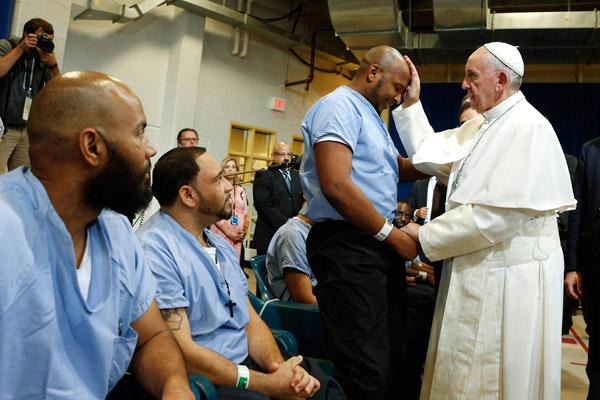
During this Year of Mercy instituted by Pope Francis, we’re called to become extensions of God’s mercy to others, particularly through the spiritual and corporal works of mercy — acts of charity and love toward others.
But one corporal work of mercy may prove a bit more challenging to carry out — visiting the imprisoned. How are we supposed to visit the imprisoned?
No doubt, it’s important to visit prisoners. They need and deserve Christian love and charity as much as anyone else. But there are different ways to be imprisoned. Just as there are physical bars that keep us locked in, there are mental, emotional and spiritual walls that keep us locked in as well.
Fears, anxiety, depression and hopelessness are all “prisons” that hold us captive, keeping us from feeling the love of God. They cage us in, stopping us from becoming children of God and from becoming the person he intended us to be. We may not have committed a crime per se, but we are incarcerated just the same.
Our Lord had compassion for those imprisoned by invisible walls as well as those imprisoned by real walls. There are numerous examples in Scripture, but the one that comes to mind is the story of the Gerasene demoniac (Mark 5:1-20) cured of his affliction and released from his cell by Jesus.
Jesus and his disciples had crossed the Sea of Galilee and entered Gerasa. There, he found a man who had long been tormented by demons and lived among the tombs. No manner of restraint could keep him from causing harm to himself or to others. The people of Gerasa feared him.
Amid the man’s shrieks, Jesus commanded the demons to leave him. At their request, Jesus sent the demons into a nearby swineherd. The swine then ran to the edge of a high cliff and jumped off, falling into the water and drowning. Only then, the man was again in his right mind and made capable of living a normal, productive life.
The Gerasene man had been imprisoned by demons, kept in a jail of torment that prohibited him from living a life of love and fruitfulness with family and friends. Jesus visited him in this prison, so to speak, by seeing him, not as he was, but as he could and should be: a free and joyful child of God.
So, too, should we see and help those who are imprisoned by a variety of walls. We should see them, not as they are, but for what they should and can be: free and joyful children of God. They need us to visit them in their prisons and to minister to them with compassion.
We may not be able to cure them of their torment, as Jesus did with the Gerasene man, but we can be for them a reflection of the light in their darkness.
Please read our Comments Policy before posting.

Related Articles
Current news, news & views from you, from the bishop.
Join Us on Facebook | Follow Us on Twitter | Privacy and Terms of Use | View and Buy Photos | Advertise | About Us
© 2024 Arkansas Catholic | 2500 N. Tyler St., Little Rock, AR 72207 | (501) 664-0125
- Digital Edition
- U.S. & World News
- Already/Not Yet
- Amid the Fray
- Ask Father Mike
- Bridging Faith
- Catholic — or Nothing
- Catholic Watchmen
- Echoes of Catholic Minnesota
- Everyday Mercies
- Faith at Home
- Faith Fundamentals
- Faith in the Public Arena
- Food from Scripture
- Inside the Capitol
- The Local Church
- Making Sense Out of Bioethics
- Simple Holiness
- Twenty Something
- Word on Fire
- Your Heart His Home
- From Readers
- Focus on Faith
- Sunday Scriptures
- Daily Scriptures
- Why I am Catholic
- Practicing Catholic
- Movie Reviews
- And the beautiful
- Video Game Reviews
- Local Events
- Classifieds
- Publication Dates

Before you go
Sign up for our free newsletter, visit the imprisoned.
To visit the imprisoned is a corporal work of mercy. Jesus mentioned it specifically when he said, “For I was . . . in prison and you visited me” (Mt 25:35, 36).
Jesus has mercy for “the least,” those despised by others. Convicts rank high among “the least.” For the general public, when a criminal gets prison time, the criminal is getting what is deserved; the criminal needs to pay for what has been done. Jesus understands the brokenness of those who have done hateful things. From the cross Jesus said, “Father, forgive them, they know not what they do” (Lk 23:34).
Jesus wants us to have compassion for those in jail or prison. Instead of having an attitude of anger, retribution, punishment or vengefulness, Jesus wants us to be merciful. We need to honestly acknowledge our own inclination to evildoing and admit, “There, except by the grace of God, go I.” Many of us are all lucky to be a “step ahead of the law,” because all of us have gotten away with something for which we deserve to be punished.
Inmates are real human beings. Prison time is hard time. It is lonely time. It is dangerous time. Prisoners need help, support, encouragement and prayers. And as Jesus explained, a visit is a great way to help a prisoner.
Visiting prisoners is not so easy these days. Security measures have been strengthened and access is restricted. A prisoner can place several names on an approved list of visitors, and volunteers can gain access to inmates only after training and background checks. So how can the average person perform the corporal work of mercy to visit the imprisoned?
If you know someone who is in prison, and if you are on the approved list of visitors, make every effort to go and visit the person. Your presence will be a great blessing.
Consider prison ministry. Ministries include prayer services, Bible studies, retreats, religious book clubs and pastoral visits. Step forward. Offer your services. Go through the orientation for jail volunteers. Submit to the background check. Embark on the corporal work of mercy of visiting the imprisoned.
Because security measures keep most people out of jails and prisons, there are spiritual things that the average person can do for those who are incarcerated. First and foremost, we can pray for those in prison. Pray that inmates, in their isolation, will know God’s constant presence and love. Pray for their safety in the face of danger. Pray for their conversion as they deal with their troubled past. And, as they deal with separation from family and friends, pray that they will receive forgiveness, a second chance and continuing support.
We can turn to St. Dismas, the criminal who was crucified next to Jesus (Lk 23:40-43), the “good thief” and the patron saint of inmates, to intercede on behalf of those who are in prison. We can also turn to St. Barbara, the other patron saint of inmates, and St. John Cafasso, the patron saint of prisons, who served prisoners, heard their confessions, granted them absolution and accompanied them on their way to the gallows. We can also work to abolish capital punishment, support halfway houses, correspond with prisoners, assist the families of those who have someone in prison, and support parish and diocesan ministries to the incarcerated.
Father Van Sloun is pastor of St. Bartholomew in Wayzata.
Related Articles
Angels among us: how helping leads to healing, admonish the sinner, delano deacon devotes decades to digging graves as he prays for those laid to rest, may: a time to celebrate and create blessed memories.
ARCHDIOCESAN SYNOD 2022 ARCHDIOCESE OF ST. PAUL & MPLS.
Contact us: [email protected]
777 Forest St., St. Paul, MN 55106 © 2022 TheCatholicSpirit.com. All rights reserved.

- Bishop Kettler's Column
- Bishop Neary's Column

National Eucharistic Pilgrimage: A once in a lifetime walk with Jesus

Upcoming local events

Parish Festivals 2024

Photos of the week May 17, 2024

Hours after first Communion, boy begins remarkable recovery

Poland honors papal biographer George Weigel with republic’s Order of Merit
- Faith in the Public Arena
- From the Editor

Afraid of Marian apparitions? Take another look this May

AI chatbot ‘Father Justin’ laicized — did we even need him?

Why listening is key for the future of pro-life movement
- Ask Father Tom
- Food for the Journey | Fr. Ron Rolheiser
- Igniting our Faith | Bishop Robert Barron
- In Light of Faith
- In the know with Father Joe
- Marriage Matters
- Parenting Journey
- Question Corner | Fr. Kenneth Doyle
- Sunday Scripture Readings
- Thanksgiving
- Theology 101
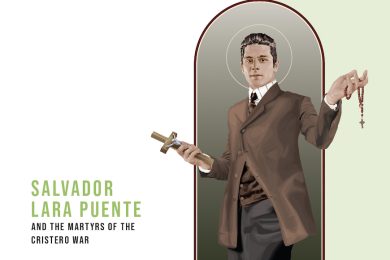
Saint of the Month: Salvador Lara Puente and the Martyrs of the Cristero War
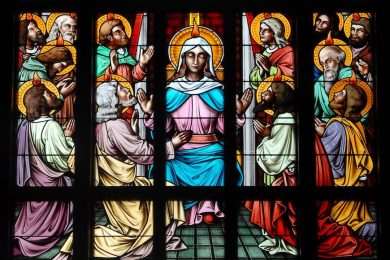
Empowered by the Holy Spirit

7 summer road trips featuring America’s Catholic landmarks
- Book Reviews
- Movie Reviews
- Video Game Reviews

LEGO’s Notre Dame model comes just in time for cathedral reopening

Sculptor known for honoring car racing greats turns attention to Father Tolton

The morality of war: Lessons from Michael Shaara’s ‘The Killer Angels’
- Catholic Social Teaching
- Eucharistic Revival
- Bishop Kettler's Pastoral Letter
- El Visitante
- Laudato Si Study Session
- Melrose Church Fire
- Pastoral Planning
- Safe Environment Articles
- The 7 Sacraments
- YAYA Awards

OSV Kids / OSV para niños – Mayo 2024

6 things you need to know about the second round of Synod listening

Father Ron Rolheiser: Reindeer Games

PEREGRINACIÓN EUCARÍSTICA NACIONAL: Un caminar único en la vida con Jesús

La paz en la política y en el mundo empieza en el corazón de las personas, dice el Papa

Que las tradiciones de mayo celebren el don de vida de María
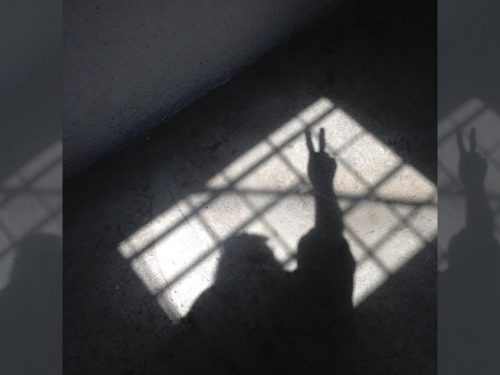
- Special Sections
- Year of Mercy
- YOM Online Lessons
Visit the Imprisoned
Online Lesson: These online lessons may be used: • by individuals anytime, anywhere. • in group settings — families, faith sharing groups, faith formation programs, and schools. • in “flipped” classroom situations for people to view before meeting face to face. You may just want to use a suggested video, story, or question — in anyway that helps us recognize that God’s mercy is anytime, anywhere, and we are called to be merciful as well. The structure of the lesson is based on Msgr. Francis Kelly’s Ecclesial Method .
Step 1 – Preparation: Each lesson will begin with a video and prayer to help us focus on the Works of Mercy in General.
Works of Mercy Reflection:
Merciful God,
You have created us to love You with all our heart, with all our soul, and with all our mind and to love our neighbor as ourselves . Yet we are often imprisoned in some way that prevents us from being as loving as we should be. Keep us mindful of those of us who are imprisoned physically, spiritually and psychologically. Give us the strength to reach out to those who are shackled in some way, and the courage to be open to those who call us to a freedom from our own bonds.
Step 2 – Proclamation: Each lesson will repeat the Works of Mercy to help us remember them.
The Spiritual Works of Mercy :
The Spiritual Works of mercy are acts of compassion, as listed below, by which we help our neighbors with their emotional and spiritual needs.
Counsel the doubtful Instruct the ignorant Admonish sinners Comfort the afflicted Forgive all offenses/injury Bear wrongs patiently Pray for the living and the dead
The Corporal Works of Mercy :
The Corporal Works of mercy are these kind acts by which we help our neighbors with their material and physical needs.
Shelter the homeless/Welcome the stranger Feed the hungry Give drink to the thirsty Clothe the naked Visit the sick Visit the imprisoned Bury the dead
Step 3 – Explanation: This step will address a specific Work of Mercy.
This Month: Visit the Imprisoned
All of the Works of Mercy boil down to this: “Beloved, if God so loved us, we also must love one another. (1 Jn 4:11)”
The Works of Mercy provide ways in which we can love better. The common theme throughout them is the continuance of our journey from self-centeredness to other-centeredness. The Reign of God is made more present as we are more attentive to others in their needs.
Visiting the Literally Imprisoned
Visiting the Imprisoned is a very challenging work in our culture. Below we will explore imprisonment metaphorically, but literal imprisonment deserves attention as well. In his blog, As I See It , Msgr. Vincent Rush posts:
This Holy Work has changed its meaning over time. The first Christians were, as you know, outlaws; so it was expected that some of their number would be in prison at any given time. Jesus was a prisoner; Paul was; Peter was; and many of the saints, bishops, and teachers of the first few centuries of Christian life were. So free Christians took it upon themselves to visit their friends, bringing food, solace, encouragement, and when possible liberation. They also sought the prisoners’ blessing, since to be imprisoned for being a Christian was a mark of great courage and faith. These days things are different, at least in our part of the world. (Christians continue to be imprisoned and even executed for their faith in the Middle East, in China, in Pakistan, in North Korea and in other countries.) People in prison are there as the result of a judgment by a criminal-justice system that, while by no means perfect, does make them different from the Christian prisoners of Jesus’ day. And modern prisons are not, by and large, visit-able places. So how are we to understand this Holy Work today? We might start by remembering that even the prisoner guilty of the most awful crime is still created in God’s image and is loved by God no less than God loves you or me. -Fr. Vincent Rush The Corporal Works of Mercy (4): To Visit the Imprisoned
Nothing helps us understand someone else better than a story. Karen Imholte shares a little of her story as an educator in the prison system, and a little bit of a story of one of her students. With a little tough love, Karen (and his Grandmother) empowered him to take a college level course that changed his life.
Along with the protection of society from truly dangerous individuals, one goal of imprisonment should always be rehabilitation so that the “lost” can be “found” and restored to a right relationship with God and others. But this costs money – for addiction treatment, for education, and for other aids to rehabilitation that are too-easily disposed of in times of budget cuts. And these programs do serve both society and prisoners – a recent study from California showed that both incarceration rates and crime dropped as rehabilitation increased. [1] -Fr. Vincent Rush The Corporal Works of Mercy (4): To Visit the Imprisoned
We are all victims of the deeds of criminals, even if it is just the climate of fear we experience when humans are violated. But how are we engaged with initiatives that make crime less likely to happen? This is a case where we cannot really change anyone but ourselves. How do we change ourselves and our system to affect positive change in others? Can we, in a sense, walk with ‘criminals’ by being proactively engaged in activities that prevent their crimes from ever happening in the first place?
Educating ourselves about the facts of imprisonment in the U.S. is a good step. Again from Fr. Vin:
The population of state and federal prisons grew by over 600% between 1972 and 1998; We imprison only a slightly lower proportion of our population than Russia, which has the highest rate in the world (we’re #2); Half of all inmates are African-American; one out of every three young African-American males is in prison, on probation, or on parole; Between 1970 and 1996 the number of women in U.S. prisons grew from about 5,600 to almost 75,000, a thirteenfold increase; most of these women were arrested for nonviolent crimes. [2] The U.S. bishops have called for reform. Their analysis and proposals are available on the web [note: their section on mission is digested below] . [3] We have to be careful not to allow our thinking about prison and prisoners (when we think about them at all) to be influenced by scaremongering to win votes (a not-unknown political phenomenon). -Fr. Vincent Rush The Corporal Works of Mercy (4): To Visit the Imprisoned
The analysis and proposals of the U.S. Bishops includes a section on the mission of the Church. How are we sent forth to address and act on this issue? Here is an encapsulation:
1. Teach right from wrong, respect for life and the law, forgiveness and mercy
“. … Catholic institutions that offer programs for youth and young adult ministry—including Catholic schools, Catholic Charities, and St. Vincent De Paul agencies—are bulwarks against crime, by providing formation for young people, enrichment and training for parents, counseling and alternatives for troubled children and families, and rehabilitative services for former inmates. ”
2. Stand with victims and their families
“. …Pastors and parish ministers must be prepared to respond quickly and effectively.
3. Reach out to offenders and their families, advocate for more treatment, and provide for the pastoral needs of all involved
“. … We know that faith has a transforming effect on all our lives. Therefore, rehabilitation and restoration must include the spiritual dimension of healing and hope. ”
4. Build community
“. … The Catholic Campaign for Human Development supports many creative efforts to prevent crime and rebuild community. ”
5. Advocate policies that help reduce violence, protect the innocent, involve the victims, and offer real alternatives to crime
“. … We must advocate on behalf of those most vulnerable to crime (the young and the elderly), ensure community safety, and attack the leading contributors to crime, which include the breakdown of family life, poverty, the proliferation of handguns, drug and alcohol addiction, and the pervasive culture of violence.”
6. Organize diocesan and state consultations
“. … We encourage diocesan leaders to convene similar processes of engagement and dialogue with those involved in the system: crime victims, former inmates, jail chaplains, judges, police officers, community leaders, prosecutors, families of victims and offenders, and others.”
7. Work for new approaches
“. … We also hope many others will join with them in efforts to prevent crime, reach out to victims, offer ministry and rehabilitation in our prisons, help to re-integrate ex-offenders, and advocate for new approaches.”
Visiting the Metaphorically Imprisoned
Fr. Vin concludes:
We can also extend the meaning of the Holy Work to consider those who are imprisoned metaphorically in other places: the elderly isolated in nursing-homes (or their own homes); people imprisoned by their addictions or their fears or their ignorance; people imprisoned by others’ views of them (immigrants, non-English speakers, people with disabilities…) The Holy Work of visiting the imprisoned can be as simple as a welcome that breaks down the wall of mistrust. That, each of us has opportunities to do every day. Until next week, peace Fr. Vin Rush Pastor’s Parish Blog “ As I See It “
Although the concept of using “visiting the imprisoned” as a metaphor is probably more comfortable to many of us than the issue literally taken, the challenges are formidable indeed. It is as simple… and as deep and demanding… as love. It is about making present the Reign of God that Jesus proclaimed. And he knew what it took.
Step 4 – Application and Appropriation into Life is the bridge between head knowledge and daily living as a disciple of Christ.
Faith in Action:
How do we reflect God’s love to those in prison? One formal initiative taken on locally is the Central Minnesota Residents Encounter Christ (REC) effort. It is a three part retreat over two days that invites participants to die with Christ, rise with Christ, and go forth to spread the Good News.
Reflection Questions:
Have you, or someone you know, ever spent time in prison? What did “visiting the imprisoned” mean at that time?
List some ways people are metaphorically imprisoned. What does “visiting the imprisoned” mean in those cases?
What are proactive ways we can change ourselves, and therefore our society, to prevent imprisonment from happening?
Suggested Activities (add your suggestions below):
- Call your local jail/prison to ask if it is appropriate to donate some Bibles to inmates. Ask about creating bookmarks with verses of encouragement.
Parish and School:
- Study statistics about the relationship between poverty and both literal and metaphorical imprisonment. Pray specifically for the imprisoned and their families as your students work on your next clothing, food or toy drive.
Step 5 – Celebration: Lessons will close with a prayer, silent or communally, that gives glory to God.
Closing Prayer:
Tender God,
You have created all of us in Your image, even those who are at the margins of society. Give us Your Spirit of Love that, as a Communion, we will create a culture in which no one would choose a path leading to imprisonment. Give us Your Spirit of Courage to find ways of walking with others, even outside of our comfort zones. Remind us that, in helping to make Your kingdom present, we must attend to those who are vulnerable in many ways as we pray the words Your Son gave to us:
Our Father, who art in heaven, hallowed be Thy name; Thy kingdom come; Thy will be done on earth as it is in heaven. Give us this day our daily bread;
and forgive us our trespasses as we forgive those who trespass against us;
and lead us not into temptation, but deliver us from evil. Amen.
In the “Leave a Reply” area below, please suggest another activity people could do to address this Work of Mercy , share a story about someone who visits the imprisoned, or write your own prayer for people in such need.
Author: Kristi Anderson
Kristi Anderson is the editor of The Central Minnesota Catholic Magazine for the Diocese of St. Cloud.
Leave a Reply Cancel reply
Save my name, email, and website in this browser for the next time I comment.
EWTN News, Inc. is the world’s largest Catholic news organization, comprised of television, radio, print and digital media outlets, dedicated to reporting the truth in light of the Gospel and the Catholic Church.
- National Catholic Register
- News Agencies
- Catholic News Agency
- CNA Deutsch
- ACI Afrique
- ACI Digital
- Digital Media
- ChurchPOP Español
- ChurchPOP Italiano
- ChurchPOP Português
- EWTN News Indepth
- EWTN News Nightly
- EWTN Noticias
- EWTN Pro-life Weekly
- Register Radio
Get HALF OFF the Register!
National Catholic Register News https://www.ncregister.com/blog/6th-corporal-work-of-mercy-visit-the-imprisoned

- Synod on Synodality
- Most Popular
- Publisher’s Note
- College Guide
- Commentaries
- Culture of Life
- Arts & Entertainment
- Publisher's Note
- Letters to the Editor
- Support the Register
- Print subscriptions
- E-Newsletter Sign-up
- EWTN Religious Catalogue
6th Corporal Work of Mercy: Visit the Imprisoned

The next corporal work of mercy includes two separate acts: “ransoming the captive” and “visiting the imprisoned.” For the purposes of this article we will look at “visiting the imprisoned” as that is a bit more accessible for the average person.
In my last article we looked at a recent pope, John Paul II, and his practice of “visiting the sick.” This week I decided to continue that trend and look at another recent pope who has made this work of mercy (visiting the imprisoned) a hallmark of his pontificate. As you may have guessed, it is none other than Pope Francis.
Loving Without Limits
It has become routine for Pope Francis to visit those in prison. On Holy Thursday he makes it a priority to celebrate Mass at a local prison, going so far as to wash the feet of the inmates there. This is not something new for Pope Francis, as he often visited the imprisoned as a bishop.
Even during his apostolic trips outside of Rome, Pope Francis has made it a part of his schedule to visit prisons. When he visited Philadelphia he stopped at the Curran-Fromhold Correctional Facility , gave a short sermon and shook hands with inmates.
During one of his recent homilies on Holy Thursday, Pope Francis addressed the prisoners and said:
“Jesus loves us, without limits, always, until the end. The love of God for us doesn't have limits. There is always more, always more. He never tires of loving anyone.”
It is clear that Pope Francis’ mission is to show to these souls that God still loves them and beckons them to reform their ways. Pope Francis is reaching out to these men and women who have made many bad choices in their life and is trying to instill hope in their hearts.
It is easy for prisoners to lose hope and turn inward upon themselves. They believe that they can never be “good” or break the cycle of sin. For many of them, it appears that God has abandoned them and does not know of their suffering.
Pope Francis realizes this state of mind and takes care not to forget these men and women, who are so often neglected. He reminds us that they have souls too and deserve our time and attention.
Prison ministry is a beautiful way of participating in this work of mercy, but is certainly not for everyone. It takes “tough skin” to encounter prisoners and is not easy. This does not mean we should not carefully discern if God is calling us to visit the imprisoned. It is very much needed in today’s world, especially in this year of Mercy.
Another way that we can participate in this work of mercy is to imitate Saint Thérèse of Lisieux. Before she entered the convent Saint Thérèse learned about a criminal sentenced to death and decided to fervently pray for his conversion. Here is how she describes it in Story of a Soul :
“Just then I heard much talk of a notorious criminal, Pranzini, who was sentenced to death for several shocking murders, and, as he was quite impenitent…How I longed to avert this irreparable calamity! In order to do so I employed all the spiritual means I could think of, and, knowing that my own efforts were unavailing, I offered for his pardon the infinite merits of Our Savior and the treasures of Holy Church…I said in all simplicity: ‘My God, I am quite sure that Thou wilt pardon this unhappy Pranzini. I should still think so if he did not confess his sins or give any sign of sorrow, because I have such confidence in Thy unbounded Mercy; but this is my first sinner, and therefore I beg for just one sign of repentance to reassure me.’ My prayer was granted to the letter…The day after his execution I hastily opened the paper, La Croix, and what did I see? … Pranzini had mounted the scaffold without confessing or receiving absolution, and the executioners were already dragging him towards the fatal block, when all at once, apparently in answer to a sudden inspiration, he turned round, seized the crucifix which the Priest was offering to him, and kissed Our Lord's Sacred Wounds three times.”
We must not forget the imprisoned or treat them like refuse to be thrown away. God loves them and He desires their salvation. Let us discern in this year of Mercy how we can practice this much needed corporal work of mercy.
Philip Kosloski Philip Kosloski graduated from the University of Saint Thomas in Minnesota with a Bachelor’s in Philosophy and Catholic Studies and completed his Master of Arts degree in Theology with the Augustine Institute. He is a writer and author of In the Footsteps of a Saint: John Paul II's Visit to Wisconsin . He blogs at philipkosloski.com and writes to help all Catholics master the art of prayer by conquering the practical obstacles that prevent a fruitful relationship with Christ.
- Related Stories
- Latest News

Orthodox Patriarch Anticipates Pope Francis Visit to Turkey for Council of Nicaea Anniversary
Next year marks the 1,700th anniversary of the First Council of Nicaea, the first ecumenical council in the Church.

Bishop Conley Shares Journey of Regaining Mental, Physical and Spiritual Health, Offering Message of Hope
Nebraska bishop shared his reflections on mental health and Christ in a May 16 pastoral letter in which he emphasized the importance of support from his friends, family, medical professionals — and his golden retriever, Stella.

4 Features of the Vatican’s New Documents on Apparitions
COMMENTARY: The new norms make no mention of Medjugorje, but it would be fair speculation to think that they were designed to make reaching a conclusion about Medjugorje easier.

Maryland Republican Senate Candidate Larry Hogan Backs Codifying Roe
Hogan, who is Catholic, called himself “pro-choice” in the interview and said he would “continue to protect the rights of women to make their own reproductive choices just like I did as governor for eight years.”

There and Back Again: How J.R.R. Tolkien Helped Save a Marriage
What is Tolkien’s contribution to his fellow man but celebration in the eucatastrophe — a happy ending that comes after a journey fraught with peril?

Two Supreme Court Cases Serve as Latest Ground in the Battle for Life
Decisions in cases involving Mifepristone and emergency-room abortions are expected before the court’s term ends in June.

St. Gianna, ‘Beautiful Witness of Hope,’ Offers Lessons Ahead of National Eucharistic Pilgrimage and Jubilee 2025
Italian saint canonized 20 years ago testifies to a life well lived, walking with Christ.

Catholic Singer Dana Scallon to Receive Highest Honor Vatican Bestows on a Layperson
Watch live online as Scallon is named a dame of the Equestrian Order of St. Gregory the Great, established in 1831, by Pope Gregory XVI.
Full Text: Harrison Butker of Kansas City Chiefs Graduation Speech
Kicking butker: kc chiefs’ star torched on social media for his graduation speech, unity in what, pope francis says conservative critics have a ‘suicidal attitude’, harrison butker supported by kansas city bishop, prominent catholics amid speech backlash, new norms give vatican greater say on alleged apparitions, how the catholic church sees the ordination of an orthodox church deaconess, toronto catholic schools allow pride flag, reject pro-life flag, elderly pro-life activist sentenced to over 2 years in prison under face act, pro-life doctor disputes new york ag’s claims that abortion-pill reversal doesn’t work, subscription options.

Subscriber Service Center Already a subscriber? Renew or manage your subscription here .
Subscribe and Save HALF OFF! Start your Register subscription today.
Give a Gift Subscription Bless friends, family or clergy with a gift of the Register.
Order Bulk Subscriptions Get a discount on 6 or more copies sent to your parish, organization or school.
Sign-up for E-Newsletter Get Register Updates sent daily or weeklyto your inbox.
The Corporal Works of Mercy
The Corporal Works of Mercy are found in the teachings of Jesus and give us a model for how we should treat all others, as if they were Christ in disguise. They "are charitable actions by which we help our neighbors in their bodily needs" ( USCCA ). They respond to the basic needs of humanity as we journey together through this life.
The seven Corporal Works of Mercy are listed below. After each work of mercy there are also suggestions and words of advice for living them out in our daily lives. Have your own suggestions? Let us know @USCCB and use the hashtag #mercyinmotion .
Feed the hungry
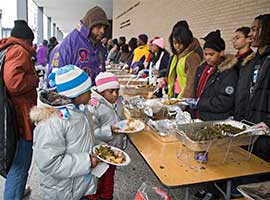
- Having delicious food at Thanksgiving or Christmas dinner? Donate to a Thanksgiving or Christmas food drive so everyone can have something to eat.
- Research, identify and contribute financially to organizations that serve the hungry.
- The next time you make a recipe that can be easily frozen, make a double batch and donate one to your local food pantry or soup kitchen.
- Try not to purchase more food than you are able to eat. If you notice that you end up throwing groceries away each week, purchasing less groceries would eliminate waste and allow you to donate the savings to those in need.
Give Drink to the thirsty
Many of our brothers and sisters in Christ do not have access to clean water and suffer from the lack of this basic necessity. We should support the efforts of those working towards greater accessibility of this essential resource.
- We take it for granted that we have access to clean water. Donate to help build wells for water for those in need
- Organize a group of children involved on a sports team (e.g. soccer) or a summer camp. Invite them to collect bottled water to distribute at a shelter for families. If parents can be involved, ask them to accompany their children in delivering the water to the families.
- Do the same for youth and young adult groups.
- Make an effort not to waste water. Remembering to turn off the water faucet when you are brushing your teeth or washing dishes can help, especially in regions suffering from drought.
Shelter the homeless
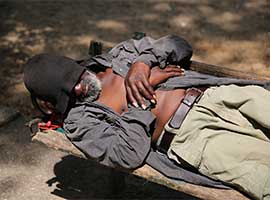
- See if your parish or diocese is involved with a local homeless shelter and volunteer some time.
- Donate time or money to organizations that build homes for those who need shelter.
- Many homeless shelters need warm blankets for their beds. If you can knit or sew that would be an extra loving gift.
- There are millions of children and families who are on the move, fleeing from war, illness, hunger and impossible living conditions, and searching for peace and safety. Engage parish groups of children, youth, young adults, and families in doing some research on the causes and challenges that these families face to survive. Contact Catholic Social Services, or diocesan offices of peace and justice for help with your research. Seek ways to provide shelter for the homeless locally, regionally, nationally or internationally.
visit the sick
Those who are sick are often forgotten or avoided. In spite of their illness, these individuals still have much to offer to those who take the time to visit and comfort them.
- Spend time volunteering at a nursing home – Get creative and make use of your talents (e.g. sing, read, paint, call Bingo, etc.)!
- Take time on a Saturday to stop and visit with an elderly neighbor.
- Offer to assist caregivers of chronically sick family members on a one-time or periodic basis. Give caregivers time off from their caregiving responsibilities so they can rest, complete personal chores, or enjoy a relaxing break.
- Next time you make a meal that can be easily frozen, make a double batch and give it to a family in your parish who has a sick loved one.
visit the prisoners
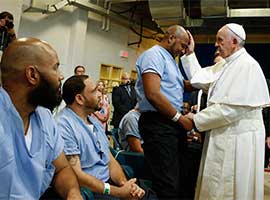
- See if your parish, or a nearby parish, has a prison ministry and if so, get involved.
- Volunteer to help out or donate to charities that give Christmas presents to children whose parents are in prison.
bury the dead
Funerals give us the opportunity to grieve and show others support during difficult times. Through our prayers and actions during these times we show our respect for life, which is always a gift from God, and comfort to those who mourn.
- Send a card to someone who has recently lost a loved one. Make your own card and use some of these prayers .
- Visit the cemetery and pray for those you have lost.
- Spend time planning your own funeral mass, read through the Order of Christian Funerals and find our hope in the Resurrection.
give alms to the poor
Donate money to organizations that have the ability to provide support and services for those in need. Do research and find organizations that put people in need first, rather than profit.
- Skip the morning latte and put that money in the collection basket at church.
- Find a charity that is meaningful to you and volunteer your time or donate.
- This Lent, give up eating out at restaurants. Pack you meals and donate the extra money to charities.
- Participate in CRS Rice Bowl

- Ministry Resources
Charity, Justice, and Mass Incarceration: How Visiting the Imprisoned Changed Me

Some things didn’t surprise me during my first visit to a state correctional facility in 2011. When I got involved with Partakers , a College Behind Bars mentoring program that pairs volunteers with incarcerated men and women working on a college degree, the program coordinator gave me plenty of advice: Leave your jewelry at home — you’re not going to like the look of the lockers. Wear a sports bra — the metal detectors are on steroids, and if they go off, you’re going home. And don’t make any plans for the rest of the day — the lines move at a snail’s pace.
Other aspects of my first visit defied expectations. Hollywood had led me to believe that I’d meet Tom, to whom I’d introduced myself via letter, in a visiting booth with a glass partition separating the two of us and that he’d be wearing an orange jumpsuit. Instead, all visitors gathered in a large, open room where we were met by men in blue jeans and white T-shirts. Tom greeted me with a warm, firm handshake, which was another surprise. I didn’t think that physical touch would be permitted, so I didn’t anticipate the messages silently conveyed in Tom’s confident, yet gentle, grip.
Though I don’t recall what exactly I expected of Tom, I clearly remember the sting of self-reproach as I was surprised by his handshake. Shame on me for having preconceived notions about a person I didn’t know merely because he was incarcerated. This was the first of many moments that I was stretched and grew through my relationship with Tom.
RELATED: Comfort the Mourning: 5 Tips for Writing a Meaningful Sympathy Note
Moments of encounter with another can be personally transformative, and that is one of the greatest blessings of putting the Corporal Works of Mercy — seven instructions based on the teachings of Jesus — into action. The works offer a clear path to honoring the dignity of all people, and they open us up to experiencing our shared humanity with our hungry, thirsty, sick, marginalized, vulnerable, and incarcerated brothers and sisters.
Like all the works of mercy, there are many ways to put visiting the imprisoned into action. Here are just a few:
Visit someone in prison
Numerous organizations coordinate relationships between volunteers and people behind bars. Pen America and Prison Fellowship are two examples, but a quick Google search will uncover other nonprofits in your area. Or find out if your church or diocese has a prison ministry . Alternatively, consider your own social networks: Do you know anyone, or do you know anyone who knows anyone, who is in jail or prison? If you worry that your visit may be unwelcome, send a letter of inquiry first.
Become a pen pal
If visiting isn’t possible, consider developing a pen pal relationship. Many people in prison, especially those on death row, have minimal contact with the outside world, and letters provide both longed-for news and human connection. Like visiting, you might start by writing to someone from your social network, or you can use a program like the Death Row Support Project to get connected. Before writing, visit the prison or jail’s website to read their rules and procedures, and also check out Mary Catherine Johnson’s tip sheet for letter writing. Although Johnson writes about her experience corresponding with someone on Georgia’s death row, she includes excellent general advice that is universally helpful.
RELATED: Catholic Social Teaching and Reducing Food Waste
Be part of criminal justice reform
You can also get involved with one of the many nonprofits working to reform our country’s broken criminal justice system through programming and advocacy. This could mean anything from offering financial support to filling numerous volunteer needs to getting the word out about the organization. Maybe you decide to host a book drive at your church for the Prison Book Program , knowing that education is proven to reduce recidivism rates . Or sign up to meet a newly released man or woman at the prison gates through the Ride Home Program with the knowledge that release can be an overwhelming and frightening time for the formerly incarcerated, and that they are at the highest risk for recidivism in their early days of freedom. Or answer hotline calls or fundraise for Freedom for Immigrants , an organization devoted to abolishing immigration detention. Any of these organizations would benefit from your time, talent, treasure, and dedication to honoring the humanity of people behind bars.
I’ve heard it said that charity and justice are the two feet of love in action : Charitable works respond to immediate needs and social justice addresses systemic, root causes of problems. I would contend that charity and justice are the caterpillar and butterfly of living out the Gospel message. Encounter with another through the Corporal Works of Mercy gives birth to personal transformation and a renewed hunger for justice. A desire to live charitably led me to Tom, and in turn, Tom led me to be challenged and changed. While I no longer visit Tom – he graduated from the program, and I moved away – I know that his graduation didn’t lead to his parole. My care for Tom and the 2.2 million others suffering under the weight of mass incarceration impacts my prayers, my decisions in the voting booth, how I talk about people behind bars, and my choices about charitable giving. Our encounter instilled in me a conviction that I must play a part in working for justice for all members of our shared humanity.
Have you joined our mailing list yet?
Sign up for weekly updates from Busted Halo!
Visit the Imprisoned
I like to talk about Our Lord’s confinement to the tabernacle with my children – His choice out of love for us – His imprisonment though we are the sinners – when we spend time in adoration we are indeed visiting the imprisoned – our dear sweet prisoner of Love. Cathy, mom of 5, Carroll, Ohio .
I pick up three sweet ladies from the local retirement home on the 1st Friday of each month and take them to Eucharistic Exposition. They would not be able to leave on their own. The kids come with me when they are not in school and this is a great experience for all! – Jody, mom of 3, Dublin, Ohio****
****note from Michele & Emily – this is one of those superstar works of mercy – they visit the sick, comfort the sorrowful/lonely, pray for the living and the dead and visit those imprisoned (in the nursing home) as well as Jesus confined in the tabernacle as Cathy explained above!
I’m the first to admit I’m a little hesitant to walk into a prison. But there are still ways we can reach out to the imprisoned so that they know they’re not alone. For example, in our city, a local parish collects reading material for prison inmates. You can take your Catholic Times, National Catholic Register, Our Sunday Visitor, This Rock, and other Catholic publications there once you are done with them. – Peggy, mom of one, Columbus, Ohio
My husband’s coworker once called me at the house during their workday to check on a story my husband had been sharing. He asked me where my husband and I met. I responded, “In jail.” As he was hanging up, I heard him tell his other co-workers,”He was telling the truth.” LOL. What I failed to tell him (because I knew my husband was having a little fun) was that we were in prison ministry at the same time. There were only 3 of us at the time and we grew close. We offered bible studies for the men at the detention centre awaiting their trials. Some weeks we had no inmates join us and we would go out for coffee and a doughnut. Other weeks we would have some inmates come out and listen to the word of God and share some of their stories with us. It gave us an opportunity to pray with them. And it makes for a great meeting story 🙂 – Melina, mom of 11, Ontario, Canada
We would love to hear how you live out the Circle Of Mercy.
Share your story here .
Recent posts.


- Mi’kmaw Parishes
- Paroisses acadiennes
- Mass for Shut-ins
- “We are each one feather”
- Donate to the Indigenous Reconciliation Fund
- Offices and Ministries
- Financial Statements
- Parish Reporting
- Organizations
- Youth Ministry
- Responsible Ministry
- Lenten Conversation Resource 2024-Word
- Lenten Conversation Resource 2024 – PDF
- Synthesis Report October 2023
- Diocesan report to the Synod
- Daily Prayers for Clergy
- Emmaus Centre
- First Communion
- Confirmation
- Vocations to the Priesthood
- Permanent Diaconate
- Newsletters
- In Memoriam
Popular Posts

Welcome To Our New Website!
June 8, 2020

Pastoral Letters from Bishop Wayne Kirkpatrick
June 23, 2021

What Can We Learn From This Pandemic?
July 3, 2020

Pastoral Appointments 2020
August 13, 2020

Reflection on the Eucharist
June 12, 2020
- All Locations
- All Locations Copy
- Annointing of the Sick
- Becoming a Catholic
- Clergy Directory
- Communications
- Custom Listing Page
- Eremitical Life
- Find a Mass
- Holy Orders
- Mi’kmaw Parishes
- Old Organizations
- Photo Gallery
- Reconciliation
- Religious Life
- Search Home
- Single Location
- Women Religious
Visit the Imprisoned

- Faithful Family Jesus Love Prayer Uncategorized Youth
- March 18, 2021
“A single act of kindness can be the spark of light needed to keep moving forward.”
Our Lenten Journey through the Corporal Works of Mercy continues.
“ Looking back a few years, I find myself in a place and situation that I had not ever dreamed of. As a Deacon Chaplain I visit and minister to men and women in prison, to those suffering in hospitals and other institutions and this service has now become a blessing in my life. Matthew’s Gospel speaking about the Corporal Works of Mercy have become my “go to” scripture passages, and my strength. Reflecting back I realize, my mind and heart are filled with memories and experiences that have moulded me into quite a different person. This ministry has transformed me.
Yes, God is calling all of us to be transformed by giving food to the hungry, welcoming the stranger, tending to the sick, giving drink to the thirsty and yes visiting those in prison. But Jesus is speaking to these actions also in a much broader sense as well. There are many forms of imprisonment in our society even today. There are of course, those who are in prison or correctional facilities. But Jesus’ words remind us of those imprisoned when they face mental and physical abuse at home, the ones suffering from mental illness and feel imprisoned by society, those whose addictions imprison them, and the lonely who feel incarcerated in their own homes, especially during this pandemic. There are many in our midst who feel imprisoned. Just as physical bars and walls keep us locked in, fears, anxiety, depression and hopelessness are all prisons that hold us captive, keeping us from feeling the love of God. The Lord had compassion for those imprisoned by invisible walls as well as those imprisoned by real walls.
Jesus calls us to action. Our Gospel constantly calls us to journey, as a people, without the exclusion or rejection of anyone. No one is to be left behind, discarded or forgotten. Being merciful, being close to those who suffer, means getting our feet and hands dirty. And that is ok because we imitate our Lord and Saviour Jesus Christ. Being unafraid to reach out with compassion to those who are “in the muck” and whose pain and imprisonment make them cry out, we begin to live like Jesus and live in Jesus. We become gradually transformed into men and women of deeper goodness, compassion and love, builders of God’s kingdom.
In these few years of Chaplaincy ministry I have learned that those to whom we reach out are the greatest of teachers, teachers of what matters: about love and lost love, compassion and lack of compassion, loneliness, fear and the gift of companionship. During this Lenten season and especially this this week, let us partake more fully in our actions and so live our mission as Christians by taking up our cross and following Jesus. Believe me if you do this you too will be transformed as I was. May God Bless you all.”
(Deacon Lorne MacNeil, Diocese of Antigonish in Corporal Works of Mercy, Atlantic Liturgical Commission, 2021)
“There are many ways to be in prison … who rely on visits for connection to themselves and the outside world.” Our youth on visiting the imprisoned:

Each Sunday of Lent, plus Palm Sunday and Wednesday of Holy Week, we will share a reflection and video to learn of and practise the seven Corporal Works of Mercy:
Feed the Hungry Give Water to the Thirsty Clothe the Needy Shelter the Homeless Visit the Sick Visit the Imprisoned Bury the Dead
The information is based on a new resource prepared by the Atlantic Liturgical Commission, and includes submission from diocesan staff and clergy throughout the Atlantic Provinces. (Click on the image to download)
We invite you to download the resource and celebrate the prayer services at home. The music, readings, reflections and prayers are provided for you and you may wish simply to use, for example, the YouTube link for the hymn, but if you are able to sing yourselves then that is encouraged. We invite you to use these rituals in ways that work best for you and your situations. That we gather to pray and act is the most important thing.
Watch for our final posting on Palm Sunday: Bury the Dead

Jennifer Hatt
Communications Officer, Diocese of Antigonish
Confraternity of Our Lady of Mercy
Women and Men Seeking Holiness as the Answer to Abortion
Corporal Works of Mercy: Visit the Imprisoned
October 1, 2015 by Fr. Ben Cameron Leave a Comment
The fifth Corporal Work of Mercy is “Visit the Imprisoned.” This work of mercy is important, and often neglected.
When I was in college, I had the privilege of being involved in the Legion of Mary, a Catholic lay apostolate that began in Ireland, that involves a commitment of two hours of apostolic work done each week, always with a partner (which is great, so that you are never alone on an assignment). One of the works that we did was that a group of the young men would visit a local state prison every week. While there, we would visit with the prisoners in the dining hall, talk to them about the Bible and our Catholic Faith, answer their questions, and, sometimes, help them with preparation for the sacraments. One of my greatest joys was to see a man who I had worked with for several months when he came out from making his first confession since early childhood — he could have leaped through the roof of the prison, he was so filled with joy!
Not all of us can visit prisons, at least not “prisons” as we normally think of them. But do we have a family member or an old friend who might be in jail or prison? Could we visit that person, or at least write to them, so that they know that they are not forgotten?
In addition to normal prisons, there are many people who are “prisoners” to addictions: could we reach out to them with the Love of the Lord Jesus Christ? Could we help them to know that Freedom is available, if they will seek out the help that they need? What about elderly or disabled persons who are “prisoners” in their own homes — could we visit and comfort them? Find some way to serve them in their time of need, and let them know that they are still remembered and loved?
When it comes to “visit the imprisoned,” maybe the most important thing to remember is that we do not approach them out of purely human (“humanitarian”) feelings. No, as Christians, we approach the imprisoned (of whatever kind of prison it might be) with the Love of Jesus in our hearts, to love and serve Jesus who is suffering in that person. That is the spirit of loving service that we saw in Mother Teresa of Calcutta, and that is the spirit in which we should approach the imprisoned.
Leave a Reply Cancel reply
Your email address will not be published. Required fields are marked *
Save my name, email, and website in this browser for the next time I comment.
This site uses Akismet to reduce spam. Learn how your comment data is processed .
- Testimony from a Woman Healed from Abortion
- The Power of God's Mercy to Heal even the Deepest Wounds
- Women of Grace: Part one of interview with Fr. Ben Cameron
Devotional Links
- Chaplet of Divine Mercy
- How to Pray the Rosary
- Miraculous Medal
- The Green Scapular
Post-abortion healing
- Entering Canaan Retreats
- Hope After Abortion – Project Rachel
- Rachel's Vineyard – International Site
- Rachel's Vineyard Kentucky
- Rachel's Vineyard Kentucky Facebook page
- Fathers of Mercy
Posts: Listed by Topics
- Art in Honor of the Unborn (2)
- Latest News (34)
- Liturgical Prayers (3)
- Prayer requests (1)
- Radio/TV interviews (4)
- Reflections from Saints and Holy Persons (34)
- Spiritual Teaching (85)
- Testimonies (5)
- Uncategorized (5)
- Works of Mercy (19)
Post Archives: By Month

Visiting The Imprisoned

Bible Verses for Visiting the Imprisoned
When we find ourselves called to visit with those who are incarcerated, it's important to remember that God's Word is our greatest source of guidance and encouragement. In this article, we'll explore key Bible verses that remind us of our responsibility to visit the imprisoned and offer them love, hope, and support. These verses will not only provide you with a deeper understanding of God's heart for the incarcerated but also inspire you to take action.
Matthew 25:36
"I was in prison and you came to visit me." - Matthew 25:36 In this passage, Jesus emphasizes the importance of visiting those who are imprisoned. He teaches that when we care for those who are suffering, we are directly serving Him. By visiting the incarcerated, we are fulfilling a crucial aspect of our Christian duty and extending the love of Christ to those who desperately need it.
Hebrews 13:3
"Continue to remember those in prison as if you were together with them in prison, and those who are mistreated as if you yourselves were suffering." - Hebrews 13:3 This verse reminds us to empathize with those who are incarcerated and to consider their suffering as if it were our own. By doing so, we not only develop compassion for the imprisoned but also deepen our understanding of their struggles. This empathy compels us to take action and comfort those who are experiencing hardship behind bars.
Proverbs 31:8-9
"Speak up for those who cannot speak for themselves, for the rights of all who are destitute. Speak up and judge fairly; defend the rights of the poor and needy." - Proverbs 31:8-9 These verses call us to be advocates for those who are unable to speak for themselves, including the incarcerated. Many prisoners face unjust treatment and are in desperate need of support and advocacy. As Christians, we are called to defend the rights of the poor and needy, ensuring that justice and fairness prevail.
Isaiah 61:1
"The Spirit of the Sovereign Lord is on me, because the Lord has anointed me to proclaim good news to the poor. He has sent me to bind up the brokenhearted, to proclaim freedom for the captives and release from darkness for the prisoners." - Isaiah 61:1 As followers of Christ, we are called to share the good news with the poor, the brokenhearted, and the imprisoned. This verse in Isaiah reminds us that God's mission includes bringing freedom and release from darkness to those who are incarcerated. By visiting prisoners and sharing the Gospel with them, we are fulfilling God's purpose and extending His transformative love.
Luke 4:18-19
"The Spirit of the Lord is on me, because he has anointed me to proclaim good news to the poor. He has sent me to proclaim freedom for the prisoners and recovery of sight for the blind, to set the oppressed free, to proclaim the year of the Lord’s favor." Visiting the imprisoned reflects Jesus' mission to bring liberation, healing, and restoration to those who are oppressed or marginalized, offering hope, redemption, and the promise of God's favor.
These verses serve as powerful reminders of our calling to visit and care for those who are imprisoned. By doing so, we are fulfilling our Christian duty, demonstrating the love of Christ, and participating in God's mission to bring freedom and hope to the captives. Let these verses inspire you to take action and serve those who are incarcerated, knowing that in doing so, you are serving Christ Himself.
What does the Bible say about visiting the imprisoned?
The Bible emphasizes the importance of visiting and caring for those who are imprisoned. Matthew 25:36, for example, quotes Jesus as saying, 'I was in prison and you came to visit me.' This passage teaches that when we care for those who are suffering, including prisoners, we are directly serving Jesus. By visiting the incarcerated, we are fulfilling a crucial aspect of our Christian duty and extending the love of Christ to those who desperately need it.
How can we develop empathy for those who are incarcerated?
Hebrews 13:3 provides guidance on how to develop empathy for those who are incarcerated: 'Continue to remember those in prison as if you were together with them in prison, and those who are mistreated as if you yourselves were suffering.' By considering the suffering of prisoners as if it were our own, we not only develop compassion for the incarcerated but also deepen our understanding of their struggles. This empathy compels us to take action and comfort those who are experiencing hardship behind bars.
What is our responsibility as Christians towards the incarcerated?
As Christians, we are called to defend the rights of the poor and needy, including those who are incarcerated. Proverbs 31:8-9 urges us to 'speak up for those who cannot speak for themselves, for the rights of all who are destitute. Speak up and judge fairly; defend the rights of the poor and needy.' Many prisoners face unjust treatment and are in desperate need of support and advocacy. We are called to ensure that justice and fairness prevail for these individuals.
What is the significance of Isaiah 61:1 in relation to prisoners?
Isaiah 61:1 highlights the mission of bringing freedom and release from darkness to those who are incarcerated: 'The Spirit of the Sovereign Lord is on me, because the Lord has anointed me to proclaim good news to the poor. He has sent me to bind up the brokenhearted, to proclaim freedom for the captives and release from darkness for the prisoners.' As followers of Christ, we are called to share the good news with the poor, the brokenhearted, and the imprisoned, and to participate in God's mission of extending His transformative love.
How can these Bible verses inspire us to take action?

Don't stress about the future alone. Chat with the Bible today.
Ready to deepen your understanding of the Scriptures and connection with God? Download Bible Chat today and embark on a transformative spiritual journey. Join us now and unlock the profound wisdom of God's Word.

Get Our Guide to 5 Life Changing Devotionals FREE!
- Skip to main content
- Skip to primary sidebar
Even If i Walk Alone
Instructing and encouraging you to live your life as a disciple of Jesus
Visiting Those in Prison
May 1, 2011 by Tim Sherfy
All around the world, there are people who have been imprisoned for no other reason than the fact they placed their faith in Jesus Christ. While it can be hard to fathom for us in the West, it remains a certain and dangerous reality for millions of our brothers and sisters. Their faith and courage are inspiring to me, and I wonder if I would have the same resolve if faced with similar circumstances.

I am very thankful that I live in a country that, to this point in my life, has allowed me to follow Christ without risk of imprisonment or torture. Still, we must remember those who daily endure hardships and persecution we can scarcely imagine.
This week I’ve been praying for the country of Eritrea. Eritrea is a small country in the Horn of Africa. Their government is in the process of systematically expelling everyone in the country who believes in Jesus. They are casting out those with the message they need most. Over 2,200 Christians remain imprisoned there. These aren’t the social club type of prisons you sometimes find in America; there is no TV, no bathroom facilities and no bed. In fact, many are held in underground cells and in shipping containers. Imagine the feeling of being trapped inside a small steel container in the heat of the sun. It is heart-wrenching to think what these believers are forced to endure.
In Matthew 25:31-45 , Jesus told us to visit those who are in prison. Most of us can’t venture to places like Eritrea, much less gain access to the prisoners there. We can, however, pray daily for them. Pray God would strengthen them, comfort them and they might reflect His glory to their fellow prisoners and to their captors. I often pray a great revival would break out from the prisons and spread throughout the entire country. Jesus welcomed into His Kingdom those who visited prisoners; the ones who ignored the incarcerated were sent away from His presence. It’s a serious command with even more serious consequences.
A great resource for encouraging believers in chains, and standing with them, is the website prisoneralert.com . At this site, you can write letters to those who are in prison for their faith. You can select phrases and Bible verses that are then translated into the language of the one to whom you are writing. Print it out when you are done, add your signature and postage, and that’s it. It’s a remarkably simple yet highly effective way to let the persecuted know they are not alone and not forgotten. In this way, we can minister to their needs, if not physically, then at least spiritually.
But what about those who aren’t in prison for their faith, the people in our own town? I don’t see any distinction in the command of Jesus between Christian and non-Christian prisoners. He said to visit those in prison, period. People who are incarcerated, regardless of the circumstance, are typically lonely and searching for meaning in their lives. This is a great opportunity for us to be the hands and feet of Jesus to them, to reflect the love of God on them. Jesus said it wasn’t the healthy who needed a doctor, but rather the sick ( Mark 2:17 ). In the same way, those in prison need to hear about the freedom found in Christ perhaps more than anyone else.
Once again, it is very clear what we should be doing. Jesus said to visit those in prison, so this is what we must do if we are serious about continuing the mission of Christ. Take some time to write to a brother or sister in prison today; better yet, make it a daily or weekly habit. Find a prison ministry in your city with which you could get involved. Men and women are dying in prison every day without the saving knowledge of Jesus Christ; we need to be doing something about that. As followers of Jesus, we all know what it was like to be a prisoner of sin. Reach out to those who remain in shackles, and tell them of the freedom found only in Christ. Live a life of obedience to Jesus, and reflect His glory to those in chains.
If you liked this, you may also enjoy...
- Living in Obedience
- Never Stop Giving
- Eternal or Temporal

Visiting Those in Prison
Last Updated on June 23, 2018 by OCF Communications
“Then the King will say to those on his right… ‘I was hungry and you gave me something to eat, I was thirsty and you gave me something to drink, I was a stranger and you invited me in, I needed clothes and you clothed me, I was sick and you looked after me, I was in prison and you came to visit me…’” (Matthew 25:34-36).
by LTC Mary Card-Mina, USA
A n often neglected portion of this passage from Matthew is the call to visit those in prison. Throughout my life I have participated in many clothing and food drives, visited the sick, and provided assistance to homeless shelters. As an OCF member, I also have seen numerous acts of charity and volunteerism focusing on all of those areas. In my own experience, however, ministry to those in prison has not been a focus—either inside or outside of the OCF community.
Recently when I visited an activities fair at our installation, a sign about prison ministry caught my attention. I was apprehensive, yet moved by the Holy Spirit to give the ministry a chance. Since then I have participated in a retreat day at the prison and shared my testimony with the inmates.
One of the most faith inspiring moments I have ever experienced happened while attending a worship service at that prison. This ministry is absolutely spectacular, and benefits not only those in prison but also the community that ministers.
Studies show that biblically based prison ministry has tremendous rehabilitative impact on inmates. In a Prison Fellowship study of 909 program participants who have been released from prison, 90 percent have mentors, 86 percent are involved with a church community, and 85 percent are gainfully employed.
Additionally, a University of Pennsylvania study that focused on a Texas program found that of those prisoners who completed their entire program, only 8 percent were re-incarcerated within a two-year period .
Conducting a prison visit is a powerful opportunity for OCF fellowships to consider. And prison visitation is directly in keeping with the mission of OCF in that these visits will “glorify God by uniting Christian officers for biblical fellowship and outreach, equipping and encouraging them to minister effectively in the military society.” There are military prisons scattered throughout the world, and any location that does not have a military prison undoubtedly has a civilian facility nearby.
Another way to minister to those in prison is to embark on a letter-writing campaign, including messages of faith-filled support and promise of prayers. Additionally, most prisons—and certainly military prisons—have a chaplaincy that might welcome donations of books and other Christian materials. There are endless possibilities for OCF members to conduct prison ministry outreach.
Share this content.
Leave a comment cancel reply.
Save my name, email, and website in this browser for the next time I comment.
Our Address

OCF is a 501(c)(3) charitable organization. Our CFC number is 10531. OCF is also a member of these organizations:

Our Connected Monthly email will keep you connected with OCF ministry news, events, and more. Subscribe or re-subscribe below.
View our email archives
Copyright © 2000-2023 Officers’ Christian Fellowship. All Rights Reserved.
[ Placeholder content for popup link ] WordPress Download Manager - Best Download Management Plugin
Creighton U. Home Page | Creighton's Online Ministries Home Page | Praying Ordinary Time Home Page
Rediscovering the Corporal Works of Mercy Home Page
Matthew 25:39-41 New International Version
39 When did we see you sick or in prison and go to visit you?’
40 “The King will reply, ‘Truly I tell you, whatever you did for one of the least of these brothers and sisters of mine, you did for me.’ ( A )
41 “Then he will say to those on his left, ‘Depart from me, ( B ) you who are cursed, into the eternal fire ( C ) prepared for the devil and his angels. ( D )
Cross references
- Matthew 25:40 : S Mt 10:40, 42; Heb 13:2
- Matthew 25:41 : S Mt 7:23
- Matthew 25:41 : Isa 66:24; Mt 3:12; S 5:22; Mk 9:43, 48; Lk 3:17; Jude 7
- Matthew 25:41 : 2Pe 2:4
Holy Bible, New International Version®, NIV® Copyright ©1973, 1978, 1984, 2011 by Biblica, Inc.® Used by permission. All rights reserved worldwide.
NIV Reverse Interlinear Bible: English to Hebrew and English to Greek. Copyright © 2019 by Zondervan.

More on the NIV
- Unleash God's Word!
Bible Gateway Recommends

OpenBible.info Geocoding Topical Bible Labs Blog
What does the Bible say about ?
A ‣ B ‣ C ‣ D ‣ E ‣ F ‣ G ‣ H ‣ I ‣ J ‣ K ‣ L ‣ M ‣ N ‣ O ‣ P ‣ Q ‣ R ‣ S ‣ T ‣ U ‣ V ‣ W ‣ Y ‣ Z
100 Bible Verses about Visit The Prison
Matthew 25:36 esv / 13 helpful votes helpful not helpful.
I was naked and you clothed me, I was sick and you visited me, I was in prison and you came to me.’
Hebrews 13:3 ESV / 12 helpful votes Helpful Not Helpful
Remember those who are in prison, as though in prison with them, and those who are mistreated, since you also are in the body.
Hebrews 10:34 ESV / 8 helpful votes Helpful Not Helpful
For you had compassion on those in prison, and you joyfully accepted the plundering of your property, since you knew that you yourselves had a better possession and an abiding one.
Psalm 69:33 ESV / 8 helpful votes Helpful Not Helpful
For the Lord hears the needy and does not despise his own people who are prisoners.
Isaiah 61:1 ESV / 7 helpful votes Helpful Not Helpful
The Spirit of the Lord God is upon me, because the Lord has anointed me to bring good news to the poor; he has sent me to bind up the brokenhearted, to proclaim liberty to the captives, and the opening of the prison to those who are bound;
Matthew 25:43 ESV / 6 helpful votes Helpful Not Helpful
I was a stranger and you did not welcome me, naked and you did not clothe me, sick and in prison and you did not visit me.’
Romans 8:28 ESV / 5 helpful votes Helpful Not Helpful
And we know that for those who love God all things work together for good, for those who are called according to his purpose.
Acts 12:5 ESV / 5 helpful votes Helpful Not Helpful
So Peter was kept in prison, but earnest prayer for him was made to God by the church.
Acts 8:3 ESV / 5 helpful votes Helpful Not Helpful
But Saul was ravaging the church, and entering house after house, he dragged off men and women and committed them to prison.
Mark 6:17 ESV / 5 helpful votes Helpful Not Helpful
For it was Herod who had sent and seized John and bound him in prison for the sake of Herodias, his brother Philip's wife, because he had married her.
Isaiah 42:7 ESV / 5 helpful votes Helpful Not Helpful
To open the eyes that are blind, to bring out the prisoners from the dungeon, from the prison those who sit in darkness.

Psalm 146:7 ESV / 5 helpful votes Helpful Not Helpful
Who executes justice for the oppressed, who gives food to the hungry. The Lord sets the prisoners free;
Revelation 20:7 ESV / 4 helpful votes Helpful Not Helpful
And when the thousand years are ended, Satan will be released from his prison
1 Peter 3:19 ESV / 4 helpful votes Helpful Not Helpful
In which he went and proclaimed to the spirits in prison,
James 1:27 ESV / 4 helpful votes Helpful Not Helpful
Religion that is pure and undefiled before God the Father is this: to visit orphans and widows in their affliction, and to keep oneself unstained from the world.
Philippians 4:13 ESV / 4 helpful votes Helpful Not Helpful
I can do all things through him who strengthens me.
2 Corinthians 3:17 ESV / 4 helpful votes Helpful Not Helpful
Now the Lord is the Spirit, and where the Spirit of the Lord is, there is freedom.
Acts 16:24 ESV / 4 helpful votes Helpful Not Helpful
Having received this order, he put them into the inner prison and fastened their feet in the stocks.
Acts 12:4 ESV / 4 helpful votes Helpful Not Helpful
And when he had seized him, he put him in prison, delivering him over to four squads of soldiers to guard him, intending after the Passover to bring him out to the people.
Acts 5:18 ESV / 4 helpful votes Helpful Not Helpful
They arrested the apostles and put them in the public prison.
Luke 3:20 ESV / 4 helpful votes Helpful Not Helpful
Added this to them all, that he locked up John in prison.
Matthew 14:10 ESV / 4 helpful votes Helpful Not Helpful
He sent and had John beheaded in the prison,
Matthew 11:2 ESV / 4 helpful votes Helpful Not Helpful
Now when John heard in prison about the deeds of the Christ, he sent word by his disciples
Jeremiah 52:11 ESV / 4 helpful votes Helpful Not Helpful
He put out the eyes of Zedekiah, and bound him in chains, and the king of Babylon took him to Babylon, and put him in prison till the day of his death.
Jeremiah 38:6 ESV / 4 helpful votes Helpful Not Helpful
So they took Jeremiah and cast him into the cistern of Malchiah, the king's son, which was in the court of the guard, letting Jeremiah down by ropes. And there was no water in the cistern, but only mud, and Jeremiah sank in the mud.
Jeremiah 32:2 ESV / 4 helpful votes Helpful Not Helpful
At that time the army of the king of Babylon was besieging Jerusalem, and Jeremiah the prophet was shut up in the court of the guard that was in the palace of the king of Judah.
Psalm 102:20 ESV / 4 helpful votes Helpful Not Helpful
To hear the groans of the prisoners, to set free those who were doomed to die,
Psalm 79:11 ESV / 4 helpful votes Helpful Not Helpful
Let the groans of the prisoners come before you; according to your great power, preserve those doomed to die!
Ezra 7:26 ESV / 4 helpful votes Helpful Not Helpful
Whoever will not obey the law of your God and the law of the king, let judgment be strictly executed on him, whether for death or for banishment or for confiscation of his goods or for imprisonment.”
Judges 16:21 ESV / 4 helpful votes Helpful Not Helpful
And the Philistines seized him and gouged out his eyes and brought him down to Gaza and bound him with bronze shackles. And he ground at the mill in the prison.
Genesis 40:3 ESV / 4 helpful votes Helpful Not Helpful
And he put them in custody in the house of the captain of the guard, in the prison where Joseph was confined.
Revelation 1:1-20 ESV / 3 helpful votes Helpful Not Helpful
The revelation of Jesus Christ, which God gave him to show to his servants the things that must soon take place. He made it known by sending his angel to his servant John, who bore witness to the word of God and to the testimony of Jesus Christ, even to all that he saw. Blessed is the one who reads aloud the words of this prophecy, and blessed are those who hear, and who keep what is written in it, for the time is near. John to the seven churches that are in Asia: Grace to you and peace from him who is and who was and who is to come, and from the seven spirits who are before his throne, and from Jesus Christ the faithful witness, the firstborn of the dead, and the ruler of kings on earth. To him who loves us and has freed us from our sins by his blood ...
Jude 1:6 ESV / 3 helpful votes Helpful Not Helpful
And the angels who did not stay within their own position of authority, but left their proper dwelling, he has kept in eternal chains under gloomy darkness until the judgment of the great day—
1 John 1:9 ESV / 3 helpful votes Helpful Not Helpful
If we confess our sins, he is faithful and just to forgive us our sins and to cleanse us from all unrighteousness.
1 Peter 3:1-22 ESV / 3 helpful votes Helpful Not Helpful
Likewise, wives, be subject to your own husbands, so that even if some do not obey the word, they may be won without a word by the conduct of their wives, when they see your respectful and pure conduct. Do not let your adorning be external—the braiding of hair and the putting on of gold jewelry, or the clothing you wear— but let your adorning be the hidden person of the heart with the imperishable beauty of a gentle and quiet spirit, which in God's sight is very precious. For this is how the holy women who hoped in God used to adorn themselves, by submitting to their own husbands, ...
2 Timothy 1:16-18 ESV / 3 helpful votes Helpful Not Helpful
May the Lord grant mercy to the household of Onesiphorus, for he often refreshed me and was not ashamed of my chains, but when he arrived in Rome he searched for me earnestly and found me— may the Lord grant him to find mercy from the Lord on that day!—and you well know all the service he rendered at Ephesus.
Philippians 1:27 ESV / 3 helpful votes Helpful Not Helpful
Only let your manner of life be worthy of the gospel of Christ, so that whether I come and see you or am absent, I may hear of you that you are standing firm in one spirit, with one mind striving side by side for the faith of the gospel,
Philippians 1:1-30 ESV / 3 helpful votes Helpful Not Helpful
Paul and Timothy, servants of Christ Jesus, To all the saints in Christ Jesus who are at Philippi, with the overseers and deacons: Grace to you and peace from God our Father and the Lord Jesus Christ. I thank my God in all my remembrance of you, always in every prayer of mine for you all making my prayer with joy, because of your partnership in the gospel from the first day until now. ...
Galatians 6:1-2 ESV / 3 helpful votes Helpful Not Helpful
Brothers, if anyone is caught in any transgression, you who are spiritual should restore him in a spirit of gentleness. Keep watch on yourself, lest you too be tempted. Bear one another's burdens, and so fulfill the law of Christ.
2 Corinthians 11:23 ESV / 3 helpful votes Helpful Not Helpful
Are they servants of Christ? I am a better one—I am talking like a madman—with far greater labors, far more imprisonments, with countless beatings, and often near death.
2 Corinthians 6:5 ESV / 3 helpful votes Helpful Not Helpful
Beatings, imprisonments, riots, labors, sleepless nights, hunger;
Acts 26:10 ESV / 3 helpful votes Helpful Not Helpful
And I did so in Jerusalem. I not only locked up many of the saints in prison after receiving authority from the chief priests, but when they were put to death I cast my vote against them.
Acts 16:27 ESV / 3 helpful votes Helpful Not Helpful
When the jailer woke and saw that the prison doors were open, he drew his sword and was about to kill himself, supposing that the prisoners had escaped.
Acts 16:26 ESV / 3 helpful votes Helpful Not Helpful
And suddenly there was a great earthquake, so that the foundations of the prison were shaken. And immediately all the doors were opened, and everyone's bonds were unfastened.
Acts 16:23 ESV / 3 helpful votes Helpful Not Helpful
And when they had inflicted many blows upon them, they threw them into prison, ordering the jailer to keep them safely.
Acts 12:6 ESV / 3 helpful votes Helpful Not Helpful
Now when Herod was about to bring him out, on that very night, Peter was sleeping between two soldiers, bound with two chains, and sentries before the door were guarding the prison.
Luke 23:19 ESV / 3 helpful votes Helpful Not Helpful
A man who had been thrown into prison for an insurrection started in the city and for murder.
Luke 4:18 ESV / 3 helpful votes Helpful Not Helpful
“The Spirit of the Lord is upon me, because he has anointed me to proclaim good news to the poor. He has sent me to proclaim liberty to the captives and recovering of sight to the blind, to set at liberty those who are oppressed,
Matthew 25:40 ESV / 3 helpful votes Helpful Not Helpful
And the King will answer them, ‘Truly, I say to you, as you did it to one of the least of these my brothers, you did it to me.’
Matthew 25:34-40 ESV / 3 helpful votes Helpful Not Helpful
Then the King will say to those on his right, ‘Come, you who are blessed by my Father, inherit the kingdom prepared for you from the foundation of the world. For I was hungry and you gave me food, I was thirsty and you gave me drink, I was a stranger and you welcomed me, I was naked and you clothed me, I was sick and you visited me, I was in prison and you came to me.’ Then the righteous will answer him, saying, ‘Lord, when did we see you hungry and feed you, or thirsty and give you drink? And when did we see you a stranger and welcome you, or naked and clothe you? ...
Matthew 25:1-46 ESV / 3 helpful votes Helpful Not Helpful
“Then the kingdom of heaven will be like ten virgins who took their lamps and went to meet the bridegroom. Five of them were foolish, and five were wise. For when the foolish took their lamps, they took no oil with them, but the wise took flasks of oil with their lamps. As the bridegroom was delayed, they all became drowsy and slept. ...
Matthew 18:30 ESV / 3 helpful votes Helpful Not Helpful
He refused and went and put him in prison until he should pay the debt.
Jeremiah 37:15 ESV / 3 helpful votes Helpful Not Helpful
And the officials were enraged at Jeremiah, and they beat him and imprisoned him in the house of Jonathan the secretary, for it had been made a prison.
Jeremiah 33:1 ESV / 3 helpful votes Helpful Not Helpful
The word of the Lord came to Jeremiah a second time, while he was still shut up in the court of the guard:
Isaiah 24:22 ESV / 3 helpful votes Helpful Not Helpful
They will be gathered together as prisoners in a pit; they will be shut up in a prison, and after many days they will be punished.
Psalm 146:4 ESV / 3 helpful votes Helpful Not Helpful
When his breath departs, he returns to the earth; on that very day his plans perish.
Psalm 142:7 ESV / 3 helpful votes Helpful Not Helpful
Bring me out of prison, that I may give thanks to your name! The righteous will surround me, for you will deal bountifully with me.
2 Chronicles 16:10 ESV / 3 helpful votes Helpful Not Helpful
Then Asa was angry with the seer and put him in the stocks in prison, for he was in a rage with him because of this. And Asa inflicted cruelties upon some of the people at the same time.
2 Kings 17:4 ESV / 3 helpful votes Helpful Not Helpful
But the king of Assyria found treachery in Hoshea, for he had sent messengers to So, king of Egypt, and offered no tribute to the king of Assyria, as he had done year by year. Therefore the king of Assyria shut him up and bound him in prison.
1 Kings 22:27 ESV / 3 helpful votes Helpful Not Helpful
And say, ‘Thus says the king, “Put this fellow in prison and feed him meager rations of bread and water, until I come in peace.”’”
Leviticus 24:12 ESV / 3 helpful votes Helpful Not Helpful
And they put him in custody, till the will of the Lord should be clear to them.
Genesis 42:16 ESV / 3 helpful votes Helpful Not Helpful
Send one of you, and let him bring your brother, while you remain confined, that your words may be tested, whether there is truth in you. Or else, by the life of Pharaoh, surely you are spies.”
Genesis 41:14 ESV / 3 helpful votes Helpful Not Helpful
Then Pharaoh sent and called Joseph, and they quickly brought him out of the pit. And when he had shaved himself and changed his clothes, he came in before Pharaoh.
Genesis 39:21 ESV / 3 helpful votes Helpful Not Helpful
But the Lord was with Joseph and showed him steadfast love and gave him favor in the sight of the keeper of the prison.
Genesis 39:20 ESV / 3 helpful votes Helpful Not Helpful
And Joseph's master took him and put him into the prison, the place where the king's prisoners were confined, and he was there in prison.
Revelation 20:5 ESV / 2 helpful votes Helpful Not Helpful
The rest of the dead did not come to life until the thousand years were ended. This is the first resurrection.
Revelation 3:19 ESV / 2 helpful votes Helpful Not Helpful
Those whom I love, I reprove and discipline, so be zealous and repent.
Revelation 2:10 ESV / 2 helpful votes Helpful Not Helpful
Do not fear what you are about to suffer. Behold, the devil is about to throw some of you into prison, that you may be tested, and for ten days you will have tribulation. Be faithful unto death, and I will give you the crown of life.
2 Timothy 2:9 ESV / 2 helpful votes Helpful Not Helpful
For which I am suffering, bound with chains as a criminal. But the word of God is not bound!
2 Timothy 1:16-17 ESV / 2 helpful votes Helpful Not Helpful
May the Lord grant mercy to the household of Onesiphorus, for he often refreshed me and was not ashamed of my chains, but when he arrived in Rome he searched for me earnestly and found me—
2 Timothy 1:16 ESV / 2 helpful votes Helpful Not Helpful
May the Lord grant mercy to the household of Onesiphorus, for he often refreshed me and was not ashamed of my chains,
2 Timothy 1:8 ESV / 2 helpful votes Helpful Not Helpful
Therefore do not be ashamed of the testimony about our Lord, nor of me his prisoner, but share in suffering for the gospel by the power of God,
2 Timothy 1:3 ESV / 2 helpful votes Helpful Not Helpful
I thank God whom I serve, as did my ancestors, with a clear conscience, as I remember you constantly in my prayers night and day.
Colossians 4:10 ESV / 2 helpful votes Helpful Not Helpful
Aristarchus my fellow prisoner greets you, and Mark the cousin of Barnabas (concerning whom you have received instructions—if he comes to you, welcome him),
Colossians 4:8 ESV / 2 helpful votes Helpful Not Helpful
I have sent him to you for this very purpose, that you may know how we are and that he may encourage your hearts,
Philippians 1:9-11 ESV / 2 helpful votes Helpful Not Helpful
And it is my prayer that your love may abound more and more, with knowledge and all discernment, so that you may approve what is excellent, and so be pure and blameless for the day of Christ, filled with the fruit of righteousness that comes through Jesus Christ, to the glory and praise of God.
Ephesians 4:1 ESV / 2 helpful votes Helpful Not Helpful
I therefore, a prisoner for the Lord, urge you to walk in a manner worthy of the calling to which you have been called,
Galatians 6:2 ESV / 2 helpful votes Helpful Not Helpful
Bear one another's burdens, and so fulfill the law of Christ.
1 Corinthians 12:21-25 ESV / 2 helpful votes Helpful Not Helpful
The eye cannot say to the hand, “I have no need of you,” nor again the head to the feet, “I have no need of you.” On the contrary, the parts of the body that seem to be weaker are indispensable, and on those parts of the body that we think less honorable we bestow the greater honor, and our unpresentable parts are treated with greater modesty, which our more presentable parts do not require. But God has so composed the body, giving greater honor to the part that lacked it, that there may be no division in the body, but that the members may have the same care for one another.
Romans 14:1-23 ESV / 2 helpful votes Helpful Not Helpful
As for the one who is weak in faith, welcome him, but not to quarrel over opinions. One person believes he may eat anything, while the weak person eats only vegetables. Let not the one who eats despise the one who abstains, and let not the one who abstains pass judgment on the one who eats, for God has welcomed him. Who are you to pass judgment on the servant of another? It is before his own master that he stands or falls. And he will be upheld, for the Lord is able to make him stand. One person esteems one day as better than another, while another esteems all days alike. Each one should be fully convinced in his own mind. ...
Romans 13:9 ESV / 2 helpful votes Helpful Not Helpful
For the commandments, “You shall not commit adultery, You shall not murder, You shall not steal, You shall not covet,” and any other commandment, are summed up in this word: “You shall love your neighbor as yourself.”
Romans 13:1-7 ESV / 2 helpful votes Helpful Not Helpful
Let every person be subject to the governing authorities. For there is no authority except from God, and those that exist have been instituted by God. Therefore whoever resists the authorities resists what God has appointed, and those who resist will incur judgment. For rulers are not a terror to good conduct, but to bad. Would you have no fear of the one who is in authority? Then do what is good, and you will receive his approval, for he is God's servant for your good. But if you do wrong, be afraid, for he does not bear the sword in vain. For he is the servant of God, an avenger who carries out God's wrath on the wrongdoer. Therefore one must be in subjection, not only to avoid God's wrath but also for the sake of conscience. ...
Romans 12:15 ESV / 2 helpful votes Helpful Not Helpful
Rejoice with those who rejoice, weep with those who weep.
Romans 12:13 ESV / 2 helpful votes Helpful Not Helpful
Contribute to the needs of the saints and seek to show hospitality.
Acts 24:23 ESV / 2 helpful votes Helpful Not Helpful
Then he gave orders to the centurion that he should be kept in custody but have some liberty, and that none of his friends should be prevented from attending to his needs.
Acts 16:16-40 ESV / 2 helpful votes Helpful Not Helpful
As we were going to the place of prayer, we were met by a slave girl who had a spirit of divination and brought her owners much gain by fortune-telling. She followed Paul and us, crying out, “These men are servants of the Most High God, who proclaim to you the way of salvation.” And this she kept doing for many days. Paul, having become greatly annoyed, turned and said to the spirit, “I command you in the name of Jesus Christ to come out of her.” And it came out that very hour. But when her owners saw that their hope of gain was gone, they seized Paul and Silas and dragged them into the marketplace before the rulers. And when they had brought them to the magistrates, they said, “These men are Jews, and they are disturbing our city. ...
Acts 12:17 ESV / 2 helpful votes Helpful Not Helpful
But motioning to them with his hand to be silent, he described to them how the Lord had brought him out of the prison. And he said, “Tell these things to James and to the brothers.” Then he departed and went to another place.
Acts 12:7 ESV / 2 helpful votes Helpful Not Helpful
And behold, an angel of the Lord stood next to him, and a light shone in the cell. He struck Peter on the side and woke him, saying, “Get up quickly.” And the chains fell off his hands.
Acts 5:19 ESV / 2 helpful votes Helpful Not Helpful
But during the night an angel of the Lord opened the prison doors and brought them out, and said,
John 3:16-17 ESV / 2 helpful votes Helpful Not Helpful
“For God so loved the world, that he gave his only Son, that whoever believes in him should not perish but have eternal life. For God did not send his Son into the world to condemn the world, but in order that the world might be saved through him.
Luke 22:33 ESV / 2 helpful votes Helpful Not Helpful
Peter said to him, “Lord, I am ready to go with you both to prison and to death.”
Luke 1:37 ESV / 2 helpful votes Helpful Not Helpful
For nothing will be impossible with God.”
Mark 6:27 ESV / 2 helpful votes Helpful Not Helpful
And immediately the king sent an executioner with orders to bring John's head. He went and beheaded him in the prison
Mark 2:17 ESV / 2 helpful votes Helpful Not Helpful
And when Jesus heard it, he said to them, “Those who are well have no need of a physician, but those who are sick. I came not to call the righteous, but sinners.”
Mark 1:14 ESV / 2 helpful votes Helpful Not Helpful
Now after John was arrested, Jesus came into Galilee, proclaiming the gospel of God,
Matthew 25:39 ESV / 2 helpful votes Helpful Not Helpful
And when did we see you sick or in prison and visit you?’
Matthew 25:35-46 ESV / 2 helpful votes Helpful Not Helpful
For I was hungry and you gave me food, I was thirsty and you gave me drink, I was a stranger and you welcomed me, I was naked and you clothed me, I was sick and you visited me, I was in prison and you came to me.’ Then the righteous will answer him, saying, ‘Lord, when did we see you hungry and feed you, or thirsty and give you drink? And when did we see you a stranger and welcome you, or naked and clothe you? And when did we see you sick or in prison and visit you?’ ...
Matthew 25:35-45 ESV / 2 helpful votes Helpful Not Helpful
Matthew 25:34 esv / 2 helpful votes helpful not helpful.
Then the King will say to those on his right, ‘Come, you who are blessed by my Father, inherit the kingdom prepared for you from the foundation of the world.
Matthew 25:31 ESV / 2 helpful votes Helpful Not Helpful
“When the Son of Man comes in his glory, and all the angels with him, then he will sit on his glorious throne.
Suggest a Verse
Enter a verse reference (e.g., john 3:16-17 ).
Visit the Bible online to search for words if you don’t know the specific passage your’re looking for.
Unless otherwise indicated, all content is licensed under a Creative Commons Attribution License . All Scripture quotations, unless otherwise indicated, are taken from The Holy Bible, English Standard Version. Copyright ©2001 by Crossway Bibles , a publishing ministry of Good News Publishers. Contact me: openbibleinfo (at) gmail.com.
- CDCR Facebook (opens new window)
- CDCR Twitter (opens new window)
- YouTube (opens new window)
- Instagram (opens new window)
How to Get Approved to Visit an Incarcerated Person
Step 1: receive signed visitor questionnaire.
You must apply for approval to visit by completing a Visitor Questionnaire (CDCR Form 106). Please obtain the Visitor Questionnaire by having the incarcerated person you wish to visit send the form to you. The incarcerated person must sign the questionnaire before sending it to the prospective visitor. This signature confirms the incarcerated person’s agreement to have the applicant added to their visiting list.
Step 2: Complete the Visitor Questionnaire
It is important to fill out the questionnaire completely. The questionnaire calls for the applicant to list all criminal convictions and all arrests, even if the arrest never led to charges or conviction. CDCR will conduct a background check for arrests and convictions when processing the application and will deny approval to visit if the check indicates an arrest or conviction not listed on the questionnaire, so you should be thorough when completing the questionnaire. It is important to note that any contact with law enforcement may result in a record of the contact in the California Law Enforcement Telecommunication System, and may require clarification by the applicant. If you are unable to remember all the specifics about an arrest or conviction, be as specific as you can in providing the approximate date and the cause of the arrest.
Step 3: Mail the Visitor Questionnaire
Mail the completed questionnaire to the Visiting Sergeant and/or Lieutenant where the prisoner you want to visit is housed. Mailing addresses can be found on each institution’s page and the list of Adult Institutions . Most prisons have different addresses for mail being sent to a prisoner and mail being sent to prison staff; be sure to get the address used for sending mail to prison staff, as the completed application should be sent to the attention of “Visiting” at the prison. Processing times for visiting questionnaires vary by institution based upon the volume of forms received and the number of staff approved to perform the review process.
Step 4: Receive Notice of Approval or Disapproval
If you are approved to visit, the incarcerated person is notified and they must notify you. Once approved, you are listed in the computer as being an approved visitor for the incarcerated person; you do not need to bring any proof of approval with you to the prison.
If you are disapproved , you will receive a letter from the prison setting forth the reason for disapproval; the prisoner will also receive notice of the disapproval but will not be given the reason. If you are denied approval to visit, you may reapply, you may appeal the denial and/or the prisoner may appeal the denial. If the reason for the denial is based on inaccurate or incomplete information on the Visitor Questionnaire, you may resubmit an accurate and complete questionnaire. Sometimes the reason for denial is that the prison requires additional information (for example, evidence that the applicant is no longer on probation); in those cases, you should resubmit the questionnaire and provide the additional information.
Appealing a Notice of Disapproval
If you do not agree with the reason given for the disapproval, you may appeal by writing to the Warden at the prison. He/she is required to respond to your appeal within 15 working days of receiving the appeal.
If dissatisfied with the institution’s response or action, you may refer your appeal, with a copy of the institution’s decision, to the Director of the Division of Adult Institutions or his/her designee at: California Department of Corrections and Rehabilitation, Division of Adult Institutions, P. O. Box 942883, Sacramento, California, 94283-0001, Attention: Director, Room 351-N
A written response to appeals addressed to the Director shall be provided within 20 working days from the date of receipt. The prisoner may independently appeal the denial of approval by utilizing the normal prisoner appeal process within the prison.
Emergency or Hardship Visits
Sometimes emergency or hardship visits are allowed before a person has been approved to visit. Such visits are at the discretion of prison staff (usually the Visiting Sergeant or Lieutenant) and are usually to accommodate an unexpected visitor traveling from a distance in excess of 250 miles. You should not rely on receiving approval to visit without going through the normal visiting application process. Whenever possible, you should plan ahead for visits and have each adult who might want to visit submit applications before they embark on a trip that will include a visit to a prisoner.
Board Member Portal

A Volunteer Visitation Program to Federal and Military Prisoners Throughout the United States
Prisoner Visitation and Support (PVS) is a volunteer visitation program for people incarcerated in federal and military prisons throughout the United States.
Our mission is to provide prisoners with regular, face to face contact from the world outside of prison to help them cope with prison life, encourage personal growth, and prepare for successful reentry into society.
Our vision is to provide qualified visitors to fulfill all requests for visits by prisoners in every federal and military prison.
Our priority is to visit those prisoners who:
• do not ordinarily receive visits from family and friends,
• want or need visits,
• are in solitary confinement,
• are on death row,
• or are serving long sentences.

“I just wanted to tell you how very thankful I am to you for what you have done for me. Mrs. Colleen is such a good-hearted person…Each visit seems to last only seconds because she is so easy to talk with. She always talks to me & treats me as if I am just a regular person & not like a low-life. Thank you so very much for bringing her into my life. She gives me something to look forward to.”
Prisoner, USMCFP Springfield, MO

“I also would like to thank you for your inspiration. You are a great person and have become a great, positive role model over the past few months. I have gained so much knowledge and wisdom that has allowed my brain to free itself from the suffering of mental servitude. Yes, you are my elder, but I have not looked upon a friendship with this much appreciation since I was very young. So I thank you very much.”
Prisoner, USP Florence, CO

“I’ve been incarcerated a little over 2 decades & I never met anyone or a group of people that really cared with no strings attached. Who would’ve ever thought that people actually would take the time to get to know a bunch of misfits that society gave up on? My grandma said that in life we will meet a lot of different people, but never forget the special ones. Suzanne is that special one for me. She really makes a difference. PVS, you are a beacon of light for guys like us.”
Prisoner, USP Coleman 2, FL

Without our Visitors...
...there is no pvs.
- About About collapsed link
- Parole & Probation Parole & Probation collapsed link
- Offender Success Offender Success collapsed link
- For Families
- For Employees
- Public Information
- Offender Search
- Director Washington
- Organizational Structure
- Deputy Directors
- Lobbyable Public Officials
Org structure
- Jeremy Bush Correctional Facilities Administration
- Julie Hamp Budget and Operations Administration
- Russ Marlan Field Operations Administration
- Office Directory
- Public Hearing Registration
- Parole Board Information
- Contact the Parole Release Unit
- Contact the Michigan Parole Board
- Vocational Village
- Reentry Services
- Employment and Opportunities Unit
- Community Corrections
- Program Development
- Parole Release Unit
Reentry About Us
Reentry Programming list
Parole release unit under prisoner reentry
- Parole & Probation
- Offender Success
Search is currently unavailable. Please try again later.
Popular on michigan.gov
- Agriculture and Rural Development
- Civil Rights
- Environment
- Health and Human Services
- Natural Resources
- Secretary of State
How Do I...
- Register to Vote
- Renew My License Plate
- View assistance programs
The web Browser you are currently using is unsupported, and some features of this site may not work as intended. Please update to a modern browser such as Chrome, Firefox or Edge to experience all features Michigan.gov has to offer.
- Google Chrome
- Microsoft Edge
Visiting a Prisoner
Please check the most current information on our Video Visitation page and In-Person Visiting page .
IN-PERSON VISITATION SCHEDULES
VISITATION INFORMATION LINKS:
Visiting Standards - English Version Estándares de visitas - Version Española Visiting Application Video Visitation Standards - English Version Video Visitando Estándares - Version Española
THE PROCESS :
The prisoner must complete a Visitor List form (CAJ-334) identifying immediate family members* and not more than 10 other potential visitors. Those persons the prisoner has placed on his/her visiting list must complete a Visiting Application (CAJ-103) to request approval to visit. The Visiting Application must be submitted in advance to the facility Mailroom or Information Desk where the prisoner is currently housed to allow for review of the Application. INCLUDING A SELF-ADDRESSED STAMPED ENVELOPE WHEN THE APPLICATION IS RETURNED WILL ENSURE THAT THE PROPOSED VISITOR IS PROVIDED NOTIFICATION OF HIS/HER APPROVAL OR DENIAL TO VISIT. NO VISITS WILL BE ALLOWED WITHOUT THIS APPROVAL.
*Immediate Family Member: A grandparent, parent, stepparent, spouse, mother-in-law, father-in-law, child, step-child, grandchild, sibling, half-sibling, stepbrother, and stepsister. An aunt or uncle may be included if adequate verification is provided that they served as a surrogate parent. If there is inadequate documentation in the prisoner's file to confirm this relationship, the prisoner or family member will be required to provide the documentation necessary to adequately confirm the relationship.
A proposed visitor shall be approved for placement on the prisoner's approved visitors list if all of the following criteria are met:
- The proposed visitor is not subject to a current visitor restriction.
- The proposed visitor is not a prisoner or a former prisoner in any jurisdiction. However, a prisoner or former prisoner who is an immediate family member may be placed on the prisoner's approved visitors list with prior approval of the Warden of the facility where the visit will occur.
- The proposed visitor is not on parole or probation in any jurisdiction as a result of a felony conviction. However, a parolee or probationer who is an immediate family member may be placed on the prisoner's approved visitors list with prior approval of the Warden of the facility where the visit will occur and written approval of the supervising field agent.
- The person is 18 years of age or older, an emancipated minor, or the minor child, stepchild, grandchild, sibling, step-sibling, or half-sibling of the prisoner. However, a minor child, stepchild, grandchild, sibling, step-sibling, or half-sibling of the prisoner shall not be approved for placement on the prisoner's approved visitors list under any of the following circumstances.
The Department is notified that there is a court order prohibiting visits between the minor child and prisoner; The Department is notified that the parental rights of the prisoner for his/her child have been terminated; The prisoner has been convicted of child abuse, criminal sexual conduct or any other assaultive or violent behavior against the minor or sibling of the minor unless an exception has been granted by the Director upon request of the warden. The warden will be notified in writing if an exception is granted.
- The proposed visitor is not on another prisoner's approved visitors list except as an immediate family member. In other words, a visitor may be on the list of all prisoners who are immediate family members but only on the list of one prisoner who is not an immediate family member.
- If the proposed visitor is a Department employee, s/he may visit only as set forth in the Employee Handbook.
- If the proposed visitor is a volunteer, s/he may visit only as set forth in PD 03.02.105 - Volunteer Services and Programs .
Notwithstanding the above, the warden may deny placement of anyone on a prisoner's approved visitor list for the safety or security of the facility, protection of the public, previous violations of visiting room rules by the proposed visitor, or for other reasonable causes as determined by the warden.
CLERGY VISITS :
Clergy may visit during the prisoner's regular visiting hours. The MDOC defines clergy as: Leaders of a religious organization or entity such as a church, mosque, or synagogue, or persons who have been granted clergy status by a recognized religion and have ecclesiastical endorsement from a religious authority. This does not include anyone who is self-ordained or designated as clergy by a prisoner.
Members of the clergy are advised to call the facility to determine visiting hours. In special circumstances, a visit outside of regular visiting hours may be approved by the warden. This approval must be granted prior to the visit.
At the facility, the member of the clergy must present to the Information Desk officer a picture ID, such as a driver's license and proof of clergy status. That documentation varies from faith group to faith group. This may be a letter of appointment to the congregation as their pastor or a copy of an ordination certificate or clergy license. Literature such as a worship bulletin or monthly newsletter that identifies the person as clergy may also be used.
For more information, please review PD 05.03.140 - Prisoner Visitation .
There are fresh calls to put more domestic violence offenders in prison. But mounting evidence suggests that 'jailing is failing'
Analysis There are fresh calls to put more domestic violence offenders in prison. But mounting evidence suggests that 'jailing is failing'
In the current firestorm of recriminations about the causes of domestic violence and how we might address it, there have been calls for the more frequent or more rapid jailing of violent men. But few are asking what happens then?
Perhaps, our jails being operated by departments of "corrections", we have assumed these men are leaving prison so corrected, and reformed of their impulse for violence.
If so, the assumption is dangerously wrong. The idea that by dispatching men, women and children to prison we're preventing them from committing further crime is deeply misguided. Instead, jail is too often a training ground for violence, populated by a ready network of future co-conspirators.
This is the finding of a series of eye-opening reports published in March by a research and policy institute called the Justice Reform Initiative (JRI). The organisation says we're doing criminal justice all wrong.
Lest anyone roll their eyes about bleeding heart academics, the JRI is stacked with the high priests of Australia's penal system, including four former high court justices, 10 former attorneys-general, three former police ministers and four former state premiers.
Their assessment is plain. Tougher sentences, and grimmer conditions inside prisons, do nothing to make the community safer; perversely, they may well do the opposite. The slogan adopted by the JRI's éminences grises: "Jailing is failing".
How do they know? The evidence, amassed over many years, is overwhelming.
A landmark paper published in The Prison Journal in 2011 found "there is little evidence that prisons reduce recidivism and at least some evidence to suggest that they have a criminogenic effect".
The study, which carries the subheading, "The High Cost of Ignoring Science", focused on soaring prison populations in the United States, and concluded "the use of custodial sanctions may have the unanticipated consequence of making society less safe".
The prison system's 'churn' pathway
The picture looks not much different back home.
Almost half of all people released from NSW prisons will return within just two years, and 57 per cent of people currently behind bars have been there before. In the Northern Territory, meanwhile, three-quarters of all people serving out a prison term in 2022 had previously done stretches inside .
In 2021, the Productivity Commission found Australia had one of the world's highest rates of recidivism. It is lumpy — South Australia in particular had a lower rate — but overall has been steadily rising for the past decade, and we compare poorly to other jurisdictions. The Commission reported that Norway's reoffending rate was 20 per cent, for example; in Austria it was 26 per cent.
The Commission said this: "High recidivism rates … suggest that many prisoners cycle in and out of prison, following a 'churn' pathway through the criminal justice system."
The majority of people in prison are serving relatively short sentences, many of which are too short to meet the eligibility requirements for rehabilitation schemes; and yet it is these men and women who most often reoffend. NSW Corrections' Violent Offender Therapeutic Program, for example, can take up to 12 months to complete.
The government has explicitly recognised that "due to the resource demands and length of their sentences, these individuals are … often released without adequate assessment or intervention".
To address this, it has introduced a range of "High Intensity Program Units" in NSW prisons targeting those on shorter sentences. The problem is, they don't seem to be working.
In 2022, the NSW Bureau of Crime Statistics and Research produced glum findings about the success of these HIPU programs, whose participants are filtered by eligibility requirements including signs of a "lack of motivation".
On the anti-violence program in particular, BOCSAR said, "we see little to no difference in reoffending rates between those who do not start a program at the HIPUs and those who start or finish a program".
Likewise, the "small differences in reimprisonment rates" did not rise to the level of statistical significance.
"Our analysis provides no evidence that receiving a program at a HIPU reduces the likelihood of any reoffending, violent reoffending or reimprisonment in the first year after release from custody. Any differences estimated in these outcomes are small and are confounded by the possibility that less risky individuals are more likely to receive a program."
It's also unclear whether programs like these are receiving the kind of financial and political capital needed for success. (The HIPU for persistently violent offenders, for example, was only being offered at one NSW prison as of last October .)
We're spending billions
The Justice Reform Initiative's March report says "there is no causal relationship between imprisonment rates and crime reduction". It cites recent research by Don Weatherburn, a renowned expert in this field and the former head of BOCSAR, who found "the available evidence paints a fairly dim picture of the effectiveness of prison in controlling crime".
Although crime would increase if incarceration was abolished altogether, Weatherburn found, "increasing the rate or risk of imprisonment above current levels would have no effect on the risk of re-offending and only a modest effect on overall rates of crime".
After decades at the coal-face of this issue, Weatherburn is unconcerned by this because there are other effective means by which to reduce the crime rate, and "more cost-effective ways of dealing with offenders other than imprisoning them".
The cost-efficiency picture is staggering.
In New South Wales alone taxpayers spend more than $2 billion a year on adult prisons, and another $201 million to incarcerate children. Each adult in prison costs almost $300 per day, and each child almost $2,800, or $1 million per year. Quite the price tag for a "corrections" program that seems to correct so few.
These concerns only grow more uncomfortable the deeper you delve. Pause to consider the typical cohort in jail (the mentally ill, the disadvantaged, the disproportionate number of First Nations people) or, indeed, the issue of drugs (one-in-three prisoners have a history of intravenous drug use) and the complexities only sharpen.
Eighty-five per cent of people in prison with a history of injecting drugs were under the influence at the time they committed the crime which landed them in jail. And 40 per cent say they were committing crimes only to fund their addiction.
"Traditional policing approaches to drug use-related crime do not reduce arrests or incarceration," the JRI says. To treat these people not as criminals but the unwell "will result in significant savings for the criminal justice system and improved outcomes for the whole community".
The missing magic ingredient
In fact, alternatives to incarceration have been shown to be radically more effective at reducing reoffending rates. Instead of one-in-two going back to jail, a recidivism rate of as low as 13.6 per cent has been achieved in Spain by emphasising and supporting healthy lifestyle choices, connections with family and emotional development.
The Productivity Commission recommended Australia pursue policies like those in Norway by paying more attention to "the underlying causes of offending" to achieve "better long-term recidivism outcomes" and lowering the cost of crime to the community. Doing so, it said, "would move Australian prison systems towards a stronger emphasis on rehabilitation and have the potential for better long-term outcomes".
Even the Institute of Public Affairs, the conservative think tank so often joined at the hip to the Liberal Party, has urged governments to embrace alternatives to prison.
However, it requires that magic ingredient missing from Australian politics for far too long: courage. Instead, "tough-on-crime" campaigns have been recycled over and again by politicians hungry for electoral success. Who among them might now admit their role in making society not more, but less safe?
- X (formerly Twitter)
Related Stories
Why law reform cannot be the only answer to australia's domestic violence crisis.
There is so much to be done to combat the gendered violence crisis. Here are a few places the government could start
Two out of five adult prisoners in New South Wales waiting 'in limbo' on remand
- Courts and Trials
- Crime Prevention
- Domestic Violence
- Prisons and Punishment
Federal inmate accused of stabbing Derek Chauvin can represent himself at trial
The federal inmate charged in December with stabbing former Minneapolis police officer Derek Chauvin in an Arizona prison can represent himself in court after a judge agreed to a request to waive his right to legal representation, court documents show.
During an hourlong hearing Wednesday before U.S. Magistrate Judge Lynnette Kimmins, the court ruled that John Turscak must still be granted "advisory/standby counsel" and "reasonable access to 'law books, witnesses, or other tools to prepare a defense.'"
A trial date set for next month was moved to Aug. 20, with an Aug. 2 plea deadline.
T.S. Hartzell, a lawyer who was named Thursday as Turscak's standby counsel, declined to comment Friday.
Turscak, 52, attacked Chauvin, who is in prison for the murder of George Floyd , with an "improvised knife" at the Federal Correctional Institution in Tucson on Nov. 24, federal prosecutors said. May 25 will mark four years since the death of Floyd, whose killing at the hands of Minneapolis police sparked nationwide protests and a racial reckoning movement.
Federal prosecutors said Turscak told them he had been thinking about assaulting Chauvin for about a month because the former officer was such a high-profile inmate.
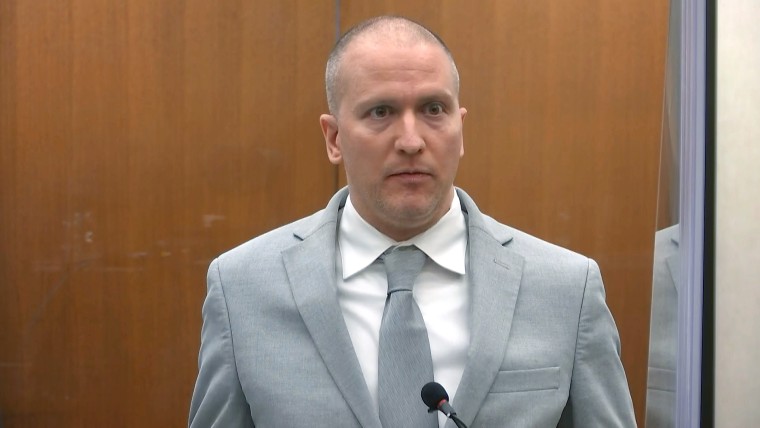
Turscak was charged with attempted murder, assault with intent to commit murder, assault with a dangerous weapon and assault resulting in serious bodily injury, according to federal prosecutors.
He also allegedly told federal prosecutors that he chose the day of the attack — the day after Thanksgiving, known as "Black Friday" — to symbolize the Black Lives Matter movement and the "Black Hand" symbol of the Mexican Mafia. According to a criminal complaint, Turscak told corrections officers that he would have killed Chauvin had they not responded so quickly.
Turscak's current release date is listed as June 4, 2026.
Federal prosecutors in Arizona declined to comment Friday citing ongoing litigation.
Chauvin was treated in a trauma care facility but later returned to prison. He is serving a 22 1/2-year sentence for kneeling on Floyd's neck for 9½ minutes while Floyd said he couldn't breathe and went limp. The former officer is simultaneously serving a 21-year federal sentence for violating Floyd's civil rights and a 22½-year state sentence for second-degree murder .
Erik Ortiz is a senior reporter for NBC News Digital focusing on racial injustice and social inequality.
Fresh off visit to Trump trial, Matt Gaetz takes to Twitter to echo Proud Boys shoutout

Rep. Matt Gaetz , R-Fla., backed Donald Trump at his hush money trial Thursday, and echoed the former president's infamous 2020 presidential debate line calling on the notorious Proud Boys to "stand back and stand by."
Trump is on week five of his trial for allegedly falsifying business records to hide campaign finance violations in a 2016 hush money payment issued to porn star Stormy Daniels . Republicans have lined up behind Trump throughout the week, blasting the judge, the witnesses and Manhattan District Attorney Alvin Bragg, some of which Trump is barred from doing under a gag order.
Gaetz had plenty of critiques to share outside the courthouse, but took it a step further on X, posting a photo of him behind the former president with the caption, "Standing back and standing by, Mr. President."
Trump trial breaking news: Latest updates as Michael Cohen returns as hush money witness
Does Gaetz align with Proud Boys? 'The tweet speaks for itself'
The line called to mind Trump's failure to condemn white supremacist groups that grew during his presidency at a 2020 presidential debate. Asked about the Proud Boys, which the Southern Poverty Law Center describes as a hate group, Trump said, "Proud Boys – stand back and stand by. But I'll tell you what, somebody's got to do something about antifa and the left."
Prep for the polls: See who is running for president and compare where they stand on key issues in our Voter Guide
Megan Squire, a professor of computer science at Elon University in North Carolina who studies online extremism, told USA TODAY at the time that the group's social media channels showed they interpreted Trump's words as encouragement.
"They were extremely excited by what he said," Squire said. "They felt validated."
When asked if Gaetz aligns with the Proud Boys as the post suggests, a spokesperson from his office said, "the tweet speaks for itself."
Regarding Gaetz's reference to the former president as "Mr. President," the spokesperson noted that he refers to Trump as "President Trump" out of respect, and does the same for President Joe Biden. Gaetz objected to the certification of Biden's Electoral College victory during the official count in 2021.
Several Proud Boys members since sentenced to prison
The Proud Boys, who describe themselves as “a pro-Western fraternal organization for men," have a history of violence, including attacking a group of antifascist protesters in Manhattan in 2018.
Several Proud Boys members are now in prison after helping to lead the mobs of people who stormed the Capitol on Jan. 6, 2021, while Congress was counting Electoral College votes to certify the election, including some sentenced by a Trump-appointed judge. Some are serving times ranging from 10-to-20 years.
Former Proud Boys national chairman Enrique Tarrio , was sentenced to 22 years, even though he was not in Washington, D.C. when mobs breached the Capitol. He was convicted of six crimes including seditious conspiracy, interference with law enforcement and aiding destruction of government property, after prosecutors argued that he was a leader in the plot.
More than 1,000 people have been charged with crimes related to Jan. 6, 2021.
Trump himself has been indicted on four federal counts for allegedly conspiring to steal the 2020 election in relation to his actions on Jan. 6, 2021 .
Matt Gaetz joins onslaught of Republicans getting around Trump trial gag order
Gaetz joined a lengthy lineup of Republicans who have made appearances at the Manhattan courthouse during Trump's hush money trial.
“We’re here of our own volition because there are things that we can say that Trump is unjustly not allowed to say,” Gaetz said at a press conference outside on a Thursday morning break. “This is a corrupt judge. These are corrupted witnesses. This is a corrupt prosecution that belies any sense of the facts or the law. We’re going to keep speaking out against this.”
Trump is under a gag order that prevents him from speaking about the witnesses, jury, prosecutors and family members of the court. Over the last few days, vice president potentials, former presidential candidates and other Republican heavy hitters have stepped in, criticizing former Trump lawyer Michael Cohen, Judge Juan Merchan and his daughter.
At least one Republican has criticized his colleagues for their courthouse appearances; Sen. Mitt Romney, R-Utah , told reporters Wednesday, "I think it’s a little demeaning to show up in front of a courthouse, particularly one where we’re talking about an allegation of paying a porn star."
Who is Matt Gaetz?
Gaetz is a far-right congressman representing the western-most part of the Florida Panhandle, including Pensacola.
He led the charge to oust former Speaker of the House Kevin McCarthy , bringing the motion to vacate and organizing a small group of Republicans to join him in going against members of his own party. A few of those lawmakers who voted out McCarthy also joined Gaetz in bashing the hush money trial Thursday, including Rep. Eli Crane, R-Ariz. and Rep. Bob Good, R-Va.
Getting McCarthy ousted elevated Gaetz's potential for higher office like governor of Florida
But McCarthy said in April that Gaetz ousted him to stop an ethics complaint about an alleged sexual encounter between Gaetz and a 17-year-old. Gaetz has repeatedly denied wrongdoing, and the Department of Justice dropped its investigation in February of 2023 .
Contributing: Bart Jansen, Courtney Subramanian, Jordan Culver USA TODAY; Jim Little, Pensacola News Journal

IMAGES
VIDEO
COMMENTS
Published: April 30, 2016. By Marge Fenelon. Catholic News Service. CNS / Paul Haring. Pope Francis blesses a prisoner as he visits the Curran-Fromhold Correctional Facility in Philadelphia Sept. 27, 2015. Visiting the imprisoned is perhaps the most challenging among the works of mercy. During this Year of Mercy instituted by Pope Francis, we ...
To visit the imprisoned is a corporal work of mercy. Jesus mentioned it specifically when he said, "For I was . . . in prison and you visited me" (Mt 25:35, 36). Jesus has mercy for "the least," those despised by others. Convicts rank high among "the least." For the general public, when a criminal gets prison time, the criminal is ...
Visit the sick Visit the imprisoned Bury the dead. Step 3 - Explanation: This step will address a specific Work of Mercy. This Month: Visit the Imprisoned. All of the Works of Mercy boil down to this: "Beloved, if God so loved us, we also must love one another. (1 Jn 4:11)" The Works of Mercy provide ways in which we can love better. The ...
What we see in the life of Mother Teresa is a shining example of a life dedicated especially to practicing the corporal works of mercy: (1) Feed the hungry. (2) Give drink to the thirsty. (3) Clothe the naked. (4) Shelter the homeless. (5) Visit those in prison. (6) Comfort the sick. (7) Bury the dead.
According to a 2012 Pew Forum Survey of U.S. prison chaplains, prisons are a "bustle of religious activity.". Seventy-four percent say attempts by inmates to convert or proselytize other ...
Philip Kosloski Blogs January 11, 2016. The next corporal work of mercy includes two separate acts: "ransoming the captive" and "visiting the imprisoned.". For the purposes of this article ...
visit the prisoners. People in prison are still people, made in the image and likeness of God. No matter what someone has done, they deserve the opportunity to hear the Word of God and find the Truth of the message of Christ. See if your parish, or a nearby parish, has a prison ministry and if so, get involved.
Visit someone in prison. Numerous organizations coordinate relationships between volunteers and people behind bars. Pen America and Prison Fellowship are two examples, but a quick Google search will uncover other nonprofits in your area. Or find out if your church or diocese has a prison ministry. Alternatively, consider your own social ...
Visit the Imprisoned. I like to talk about Our Lord's confinement to the tabernacle with my children - His choice out of love for us - His imprisonment though we are the sinners - when we spend time in adoration we are indeed visiting the imprisoned - our dear sweet prisoner of Love. Cathy, mom of 5, Carroll, Ohio.
Visit the Sick Visit the Imprisoned Bury the Dead. ... The music, readings, reflections and prayers are provided for you and you may wish simply to use, for example, the YouTube link for the hymn, but if you are able to sing yourselves then that is encouraged. We invite you to use these rituals in ways that work best for you and your situations.
jail or prison and the need for training in how to minister to the imprisoned. Respecting human dignity may dictate that you don't, personally, visit those in prison. Find out who in your area is visiting prisoners. Ask how you can provide support or get involved. Above all, pray for those in prison. Don't limit your imagination.
The fifth Corporal Work of Mercy is "Visit the Imprisoned." This work of mercy is important, and often neglected. When I was in college, I had the privilege of being involved in the Legion of Mary, a Catholic lay apostolate that began in Ireland, that involves a commitment of two hours of apostolic work done each week, always with a partner (which is great, so that you are never alone on ...
The Bible emphasizes the importance of visiting and caring for those who are imprisoned. Matthew 25:36, for example, quotes Jesus as saying, 'I was in prison and you came to visit me.'. This passage teaches that when we care for those who are suffering, including prisoners, we are directly serving Jesus. By visiting the incarcerated, we are ...
For example, two men, Agapius and Dionysius, helped six fellow Christians who were imprisoned. In the process, they drew attention to themselves and were eventually imprisoned and beheaded because ...
He said to visit those in prison, period. People who are incarcerated, regardless of the circumstance, are typically lonely and searching for meaning in their lives. This is a great opportunity for us to be the hands and feet of Jesus to them, to reflect the love of God on them. Jesus said it wasn't the healthy who needed a doctor, but rather ...
Visit the Imprisoned. Posted by paulcoholic on 22 January 2013, 3:47 pm. Matthew 25:36: "…in prison and you visited me.'". "Imprisoned" can mean many things. It may oftentimes mean the literal imprisonment of those who have committed crimes. "You do the crime, you do the time.". And so people regard with indifference or contempt ...
Conducting a prison visit is a powerful opportunity for OCF fellowships to consider. And prison visitation is directly in keeping with the mission of OCF in that these visits will "glorify God by uniting Christian officers for biblical fellowship and outreach, equipping and encouraging them to minister effectively in the military society.".
Visit the Sick. Sometimes we can get squeamish about being around hospitals or nursing homes, but this work of mercy invites us to visit someone who is in the hospital or is housebound. The touch of a hand, a hug and real eye contact are great healers to the human spirit. Visiting the sick can be challenging for those of us who are healthy, and ...
39 When did we see you sick or in prison and go to visit you?'. 40 "The King will reply, 'Truly I tell you, whatever you did for one of the least of these brothers and sisters of mine, you did for me.'. 41 "Then he will say to those on his left, 'Depart from me, you who are cursed, into the eternal fire prepared for the devil and ...
Matthew 25:1-46 ESV / 5 helpful votesHelpfulNot Helpful. "Then the kingdom of heaven will be like ten virgins who took their lamps and went to meet the bridegroom. Five of them were foolish, and five were wise. For when the foolish took their lamps, they took no oil with them, but the wise took flasks of oil with their lamps.
Revelation 2:10 ESV / 2 helpful votesHelpfulNot Helpful. Do not fear what you are about to suffer. Behold, the devil is about to throw some of you into prison, that you may be tested, and for ten days you will have tribulation. Be faithful unto death, and I will give you the crown of life.
Step 1: Receive Signed Visitor Questionnaire. You must apply for approval to visit by completing a Visitor Questionnaire (CDCR Form 106). Please obtain the Visitor Questionnaire by having the incarcerated person you wish to visit send the form to you. The incarcerated person must sign the questionnaire before sending it to the prospective visitor.
Prisoner Visitation and Support (PVS) is a volunteer visitation program for people incarcerated in federal and military prisons throughout the United States. Our mission is to provide prisoners with regular, face to face contact from the world outside of prison to help them cope with prison life, encourage personal growth, and prepare for ...
In special circumstances, a visit outside of regular visiting hours may be approved by the warden. This approval must be granted prior to the visit. At the facility, the member of the clergy must present to the Information Desk officer a picture ID, such as a driver's license and proof of clergy status.
A court in Austria said Tuesday it had ruled that the country's most infamous living criminal, incestuous rapist Josef Fritzl, could be transferred to a regular prison from a prison psychiatric ...
Hundreds of officers mobilized in "unprecedented" effort to catch the armed gang that killed two prison officers during an ambush. IE 11 is not supported. For an optimal experience visit our site ...
Each adult in prison costs almost $300 per day, and each child almost $2,800, or $1 million per year. Quite the price tag for a "corrections" program that seems to correct so few.
The man charged with assaulting former Speaker Nancy Pelosi's (D-Calif.) husband in 2022 was sentenced Friday to 30 years in prison. David DePape, 44, broke into Pelosi's California home and …
Chauvin was treated in a trauma care facility but later returned to prison. He is serving a 22 1/2-year sentence for kneeling on Floyd's neck for 9½ minutes while Floyd said he couldn't breathe ...
Fresh off visit to Trump trial, Matt Gaetz takes to Twitter to echo Proud Boys shoutout ... Several Proud Boys members are now in prison after helping to lead the mobs of people who stormed the ...